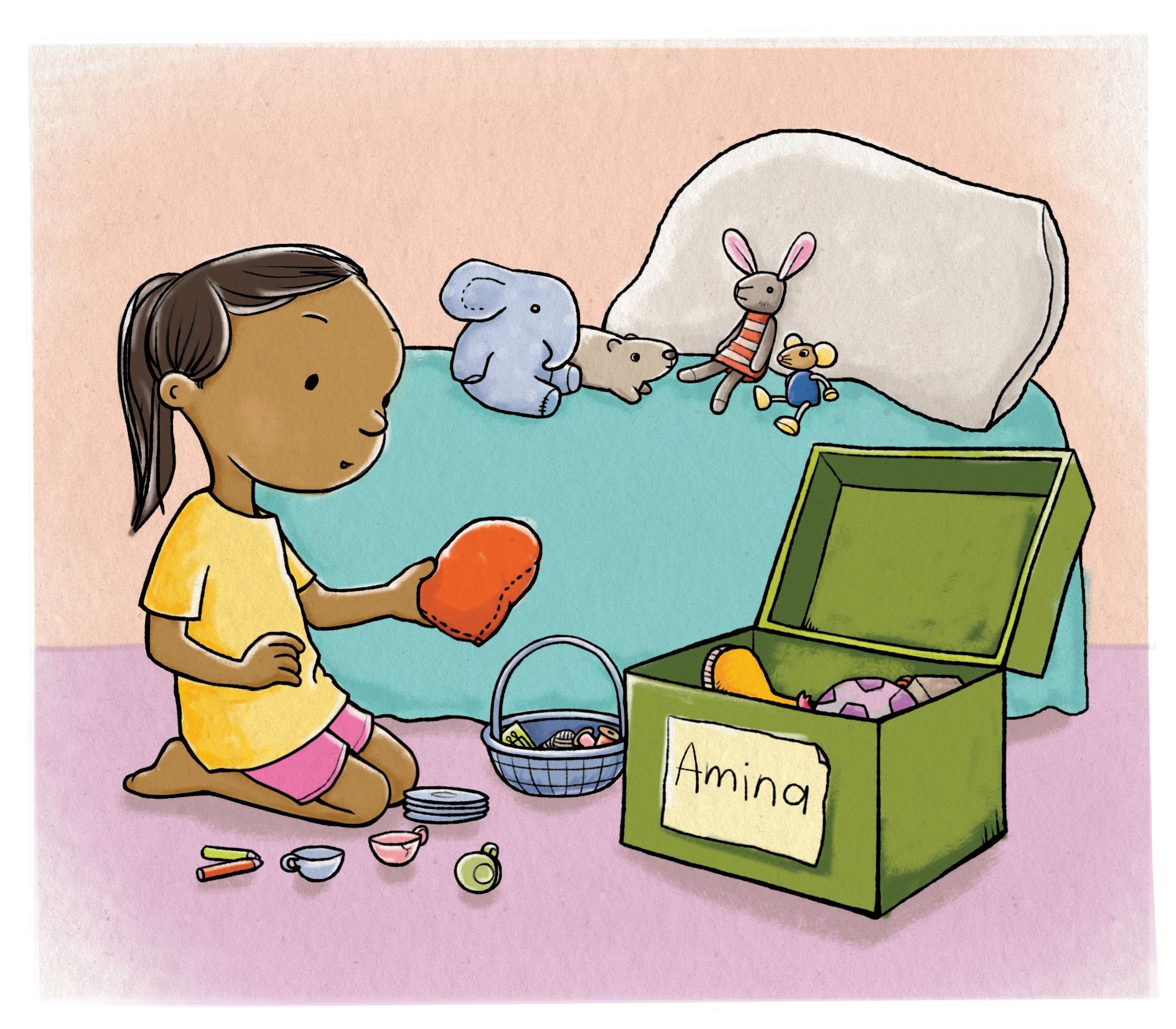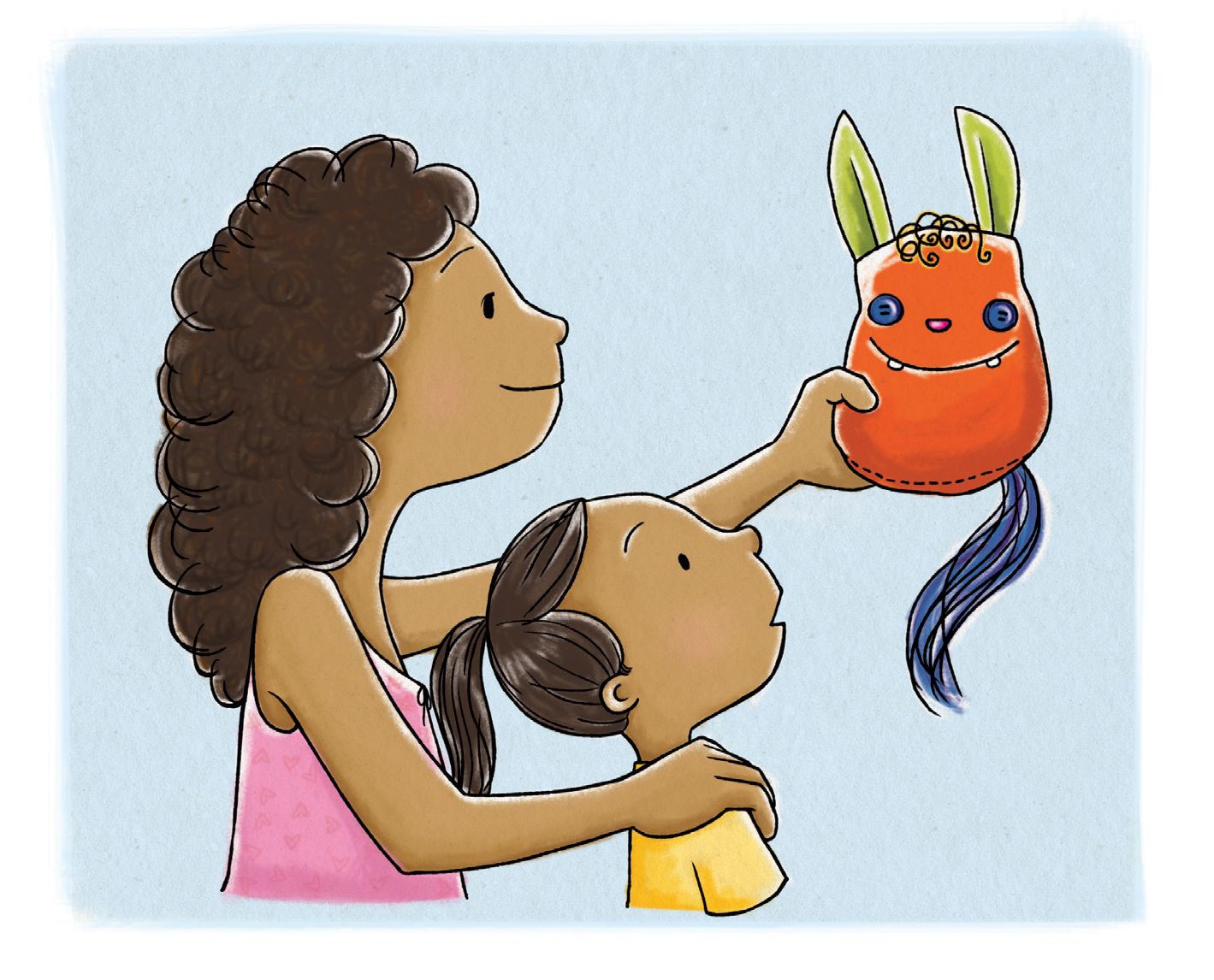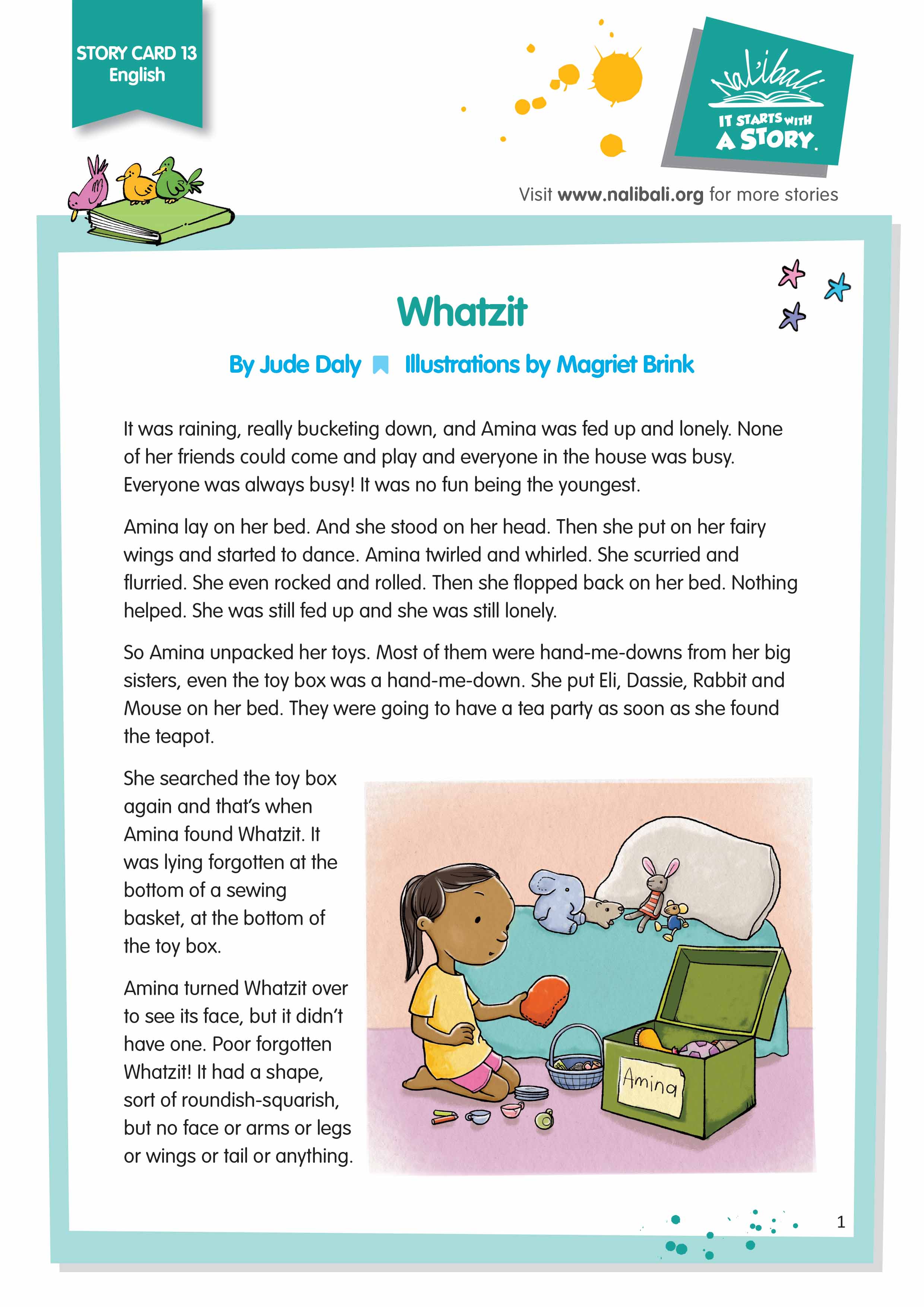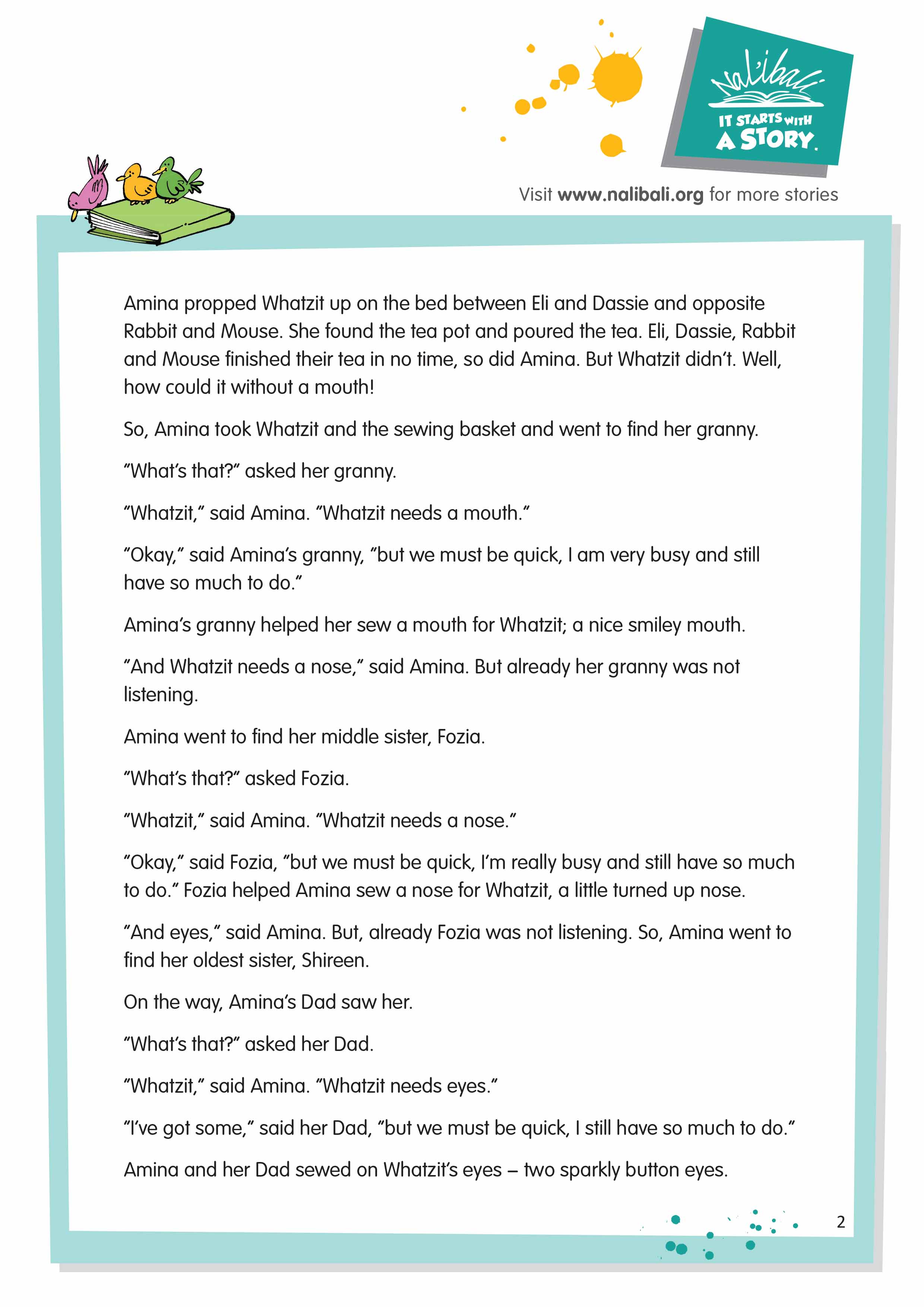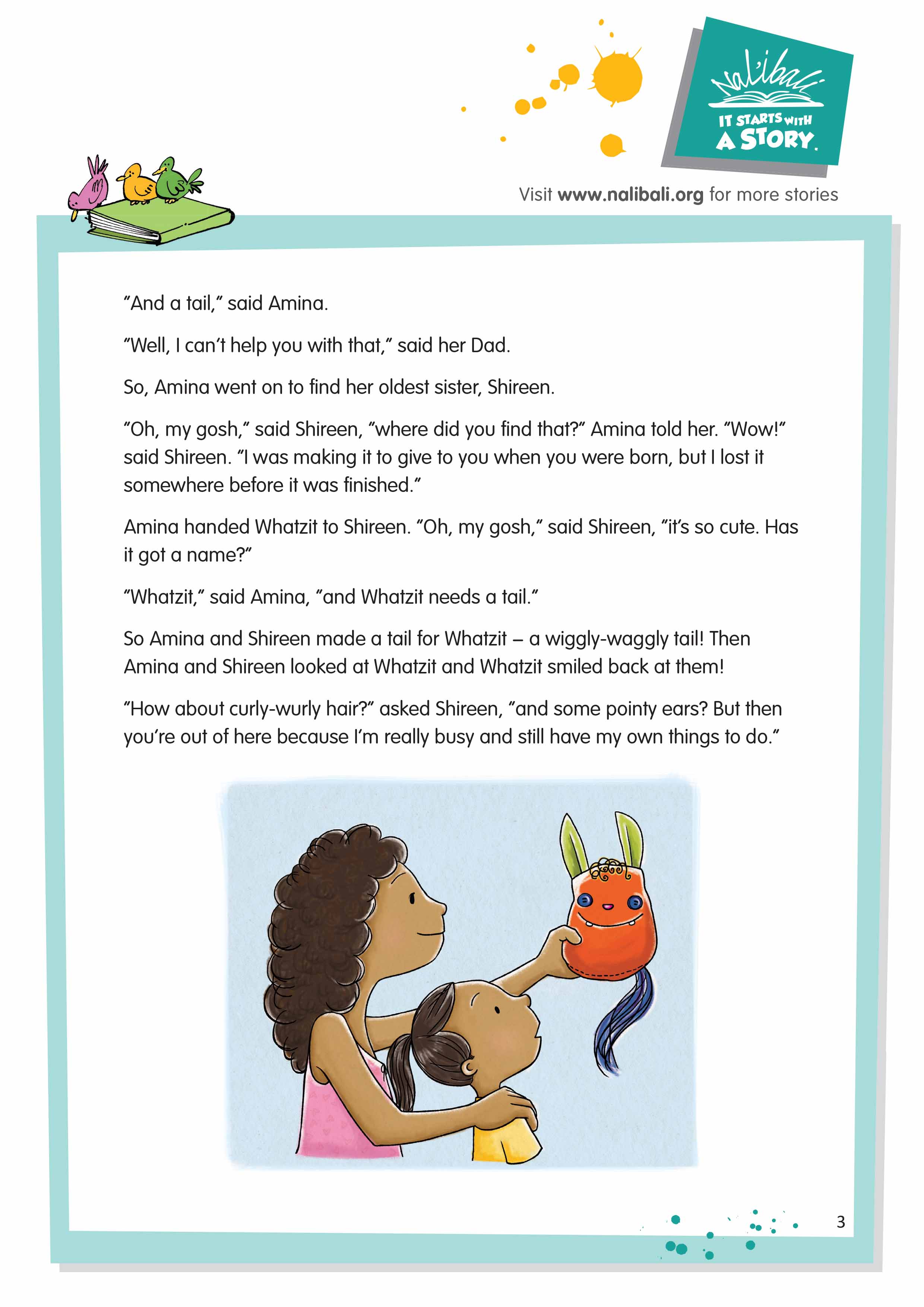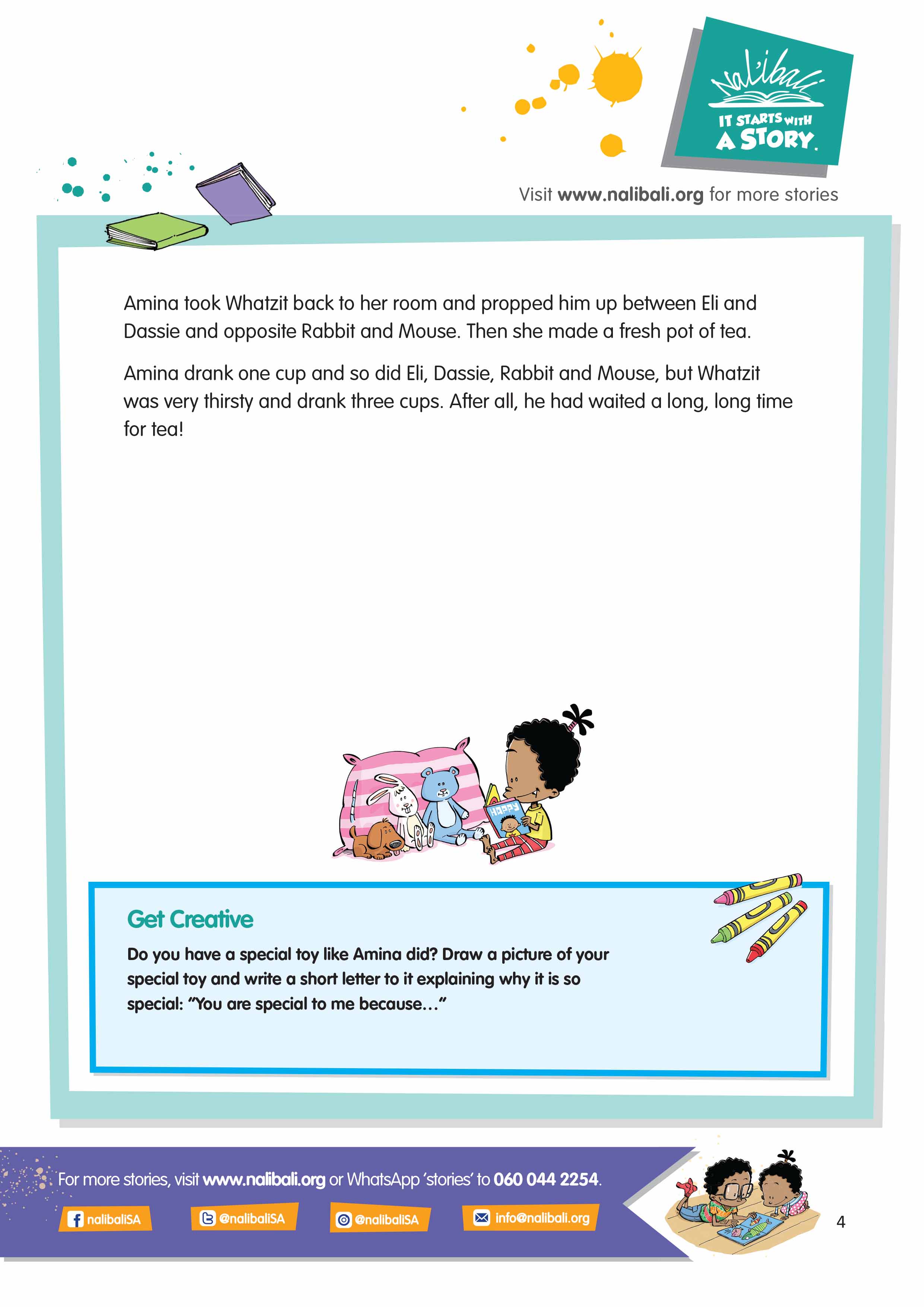ENGLISH STORIES
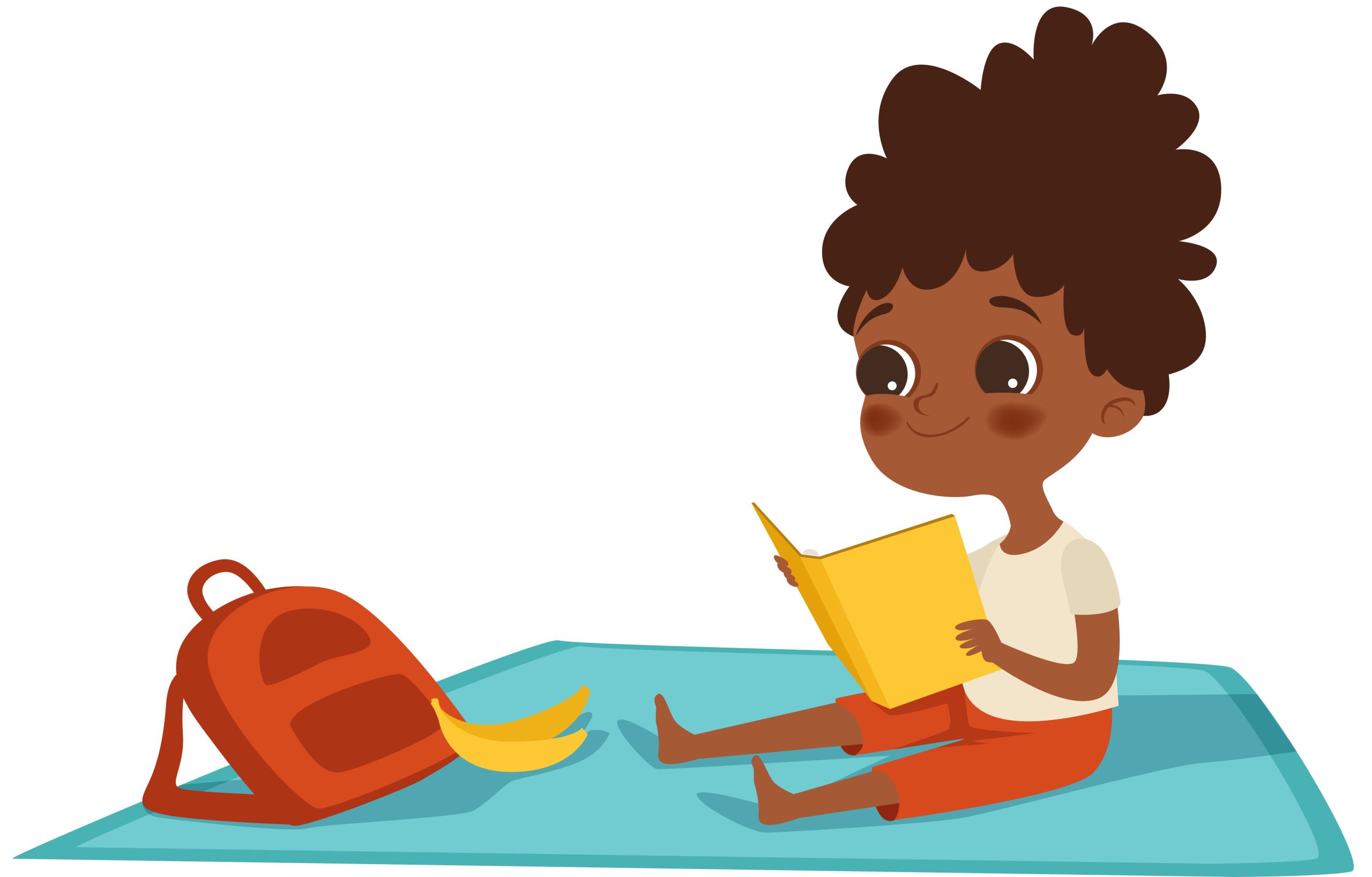
The lion and the monkey
By Ikeogu Oke
Illustrations by Jiggs Snaddon-Wood
One day Grandpa wanted to teach us a lesson about trust and gratitude, so he
told us a story about the lion and the monkey …
The lion and the monkey lived in a thick jungle. The lion roamed the jungle floor,
while the monkey lived in the treetops. One day the lion saw some meat on
top of a banana leaf
on the jungle floor.
“There’s a free and
easy meal for me,”
he thought.
The lion moved
towards the middle
of the banana leaf,
but as he sunk his
teeth into the meat,
the ground gave way
beneath him. Together
with the meat and the
banana leaf, he fell
into a deep pit.
“How was the lion
to have known that
a free meal is not
always free; that
an easy meal is not
always as easy as it
seems?” commented Grandpa. “How could the king of the jungle have known
that a hunter had dug a deep pit and covered it with the banana leaf, then
placed the meat in the middle of the leaf and covered the leaf with sand to
disguise it?”
The pit was so narrow that the lion could only stand upright, on his hind legs.
He made frantic efforts to climb out of the deep pit, but with each attempt the
red soil crumbled under his claws and he sank back to the bottom of the pit.
The exhausted lion was still there at dusk when suddenly he saw a tail pass
by. The tail belonged to a monkey who had jumped over the pit. The lion called
desperately for help.
“What is the royal one doing in such a deep dark place?” asked the monkey
looking into the pit.
“I fell in,” said the lion in a weak voice. “I have been here all day. Please
help me.”
The monkey hesitated and started to walk away, but the lion begged him again.
Then the monkey said, “I am told that all the animals that ever did you a good
turn, never lived to tell the story.”
“I know you are too smart to believe lies told by my enemies,” said the lion.
“Please, please help me.”
In the end the monkey took pity on the lion and lowered his tail into the pit like a
rope. The lion held on to the monkey’s tail and climbed up it. But even when he
was out of the pit, the lion hung onto the monkey’s tail.
“Let me go! Haven’t I helped you out of the deep pit as you begged me to?” the
monkey asked the lion.
But the lion tightened his grip on the monkey’s tail even more, and when the
monkey looked into the lion’s eyes, he saw the look of hunger. “Please let me
go!” the monkey cried. But the lion’s grip only got tighter.
Suddenly, an old woman appeared. She was on her way to her farm when
she saw the animals arguing. She stopped and asked them why they were
quarrelling. The monkey told her how he had helped the lion out of the deep pit.
“But now he is holding onto my tail and he won’t let me go,” he complained.
“Is this true?” the old woman asked the lion. The lion nodded in agreement.
Then the old woman said to the monkey, “Clasp your hands and say, ‘I am
about to die for my kindness. I am about to die for my kindness.’” So the
monkey did this.
The old woman then turned to the lion and said, “Clasp your paws and say,
‘Someone is about to die for his kindness. Someone is about to die for his
kindness.’” The lion raised his free front paw and repeated the old
woman’s words.
“No!” said the old woman. “I said clasp your paws, and I mean your two front
paws, and then say the words.” As the lion obeyed her command and clasped
his paws, the monkey escaped and ran away. The lion chased the monkey until
the monkey climbed up a nearby tree. Crestfallen, the lion looked back at the
spot where they had seen the old woman, but she was no longer there.
Grandpa paused and looked at our faces that had suddenly lit up at the happy
ending for the monkey.
Get Creative
“No!” said the old woman. “I said clasp your paws, and I mean your two front
paws, and then say the words.” As the lion obeyed her command and clasped
his paws, the monkey escaped and ran away. The lion chased the monkey until
the monkey climbed up a nearby tree. Crestfallen, the lion looked back at the
spot where they had seen the old woman, but she was no longer there.
Grandpa paused and looked at our faces that had suddenly lit up at the happy
ending for the monkey.
Use paper plates, scissors, paper, paint and
glue to create lion and monkey masks. Use
sticky tape to attach them to long sticks. Then
have fun acting out the story with your masks.
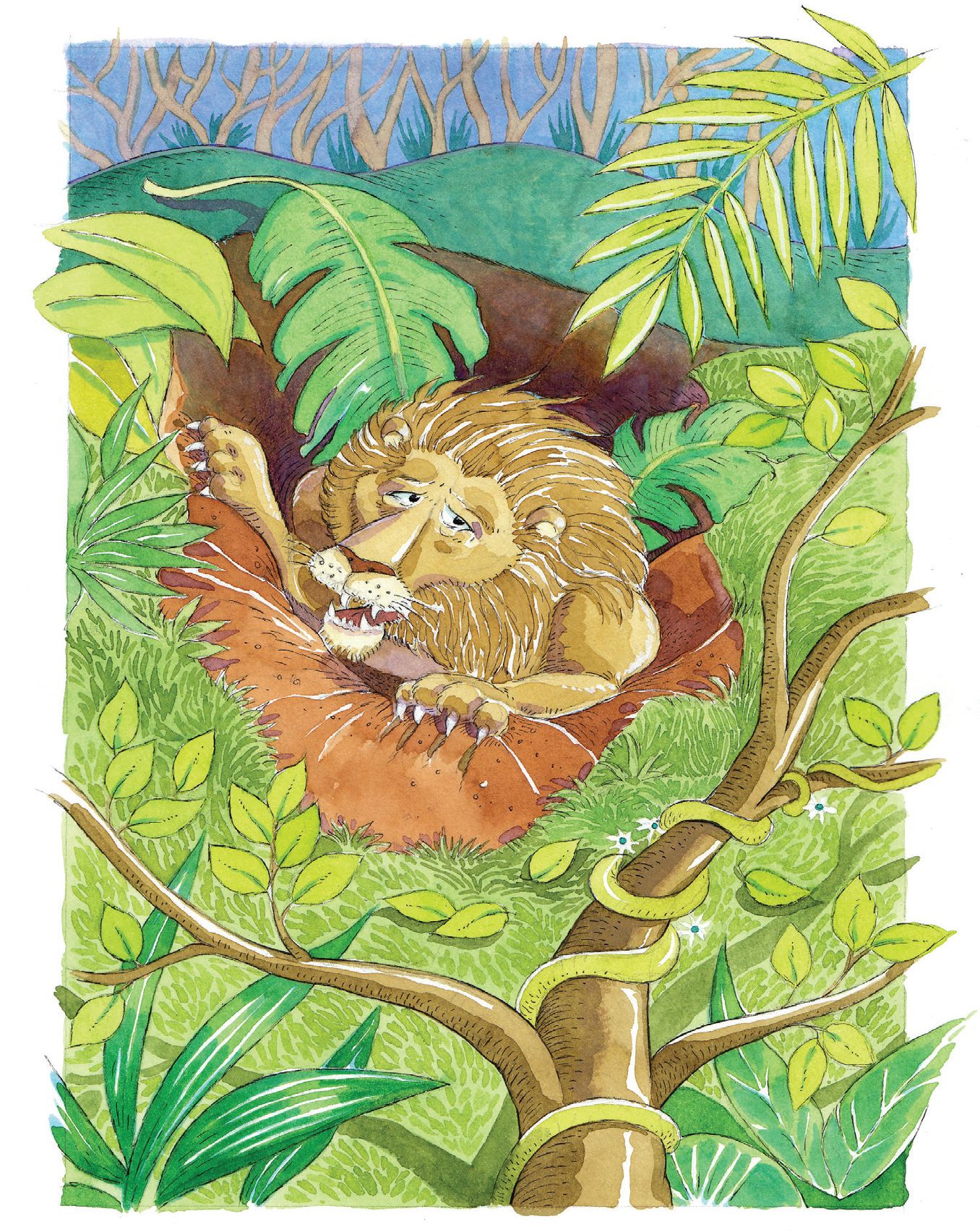
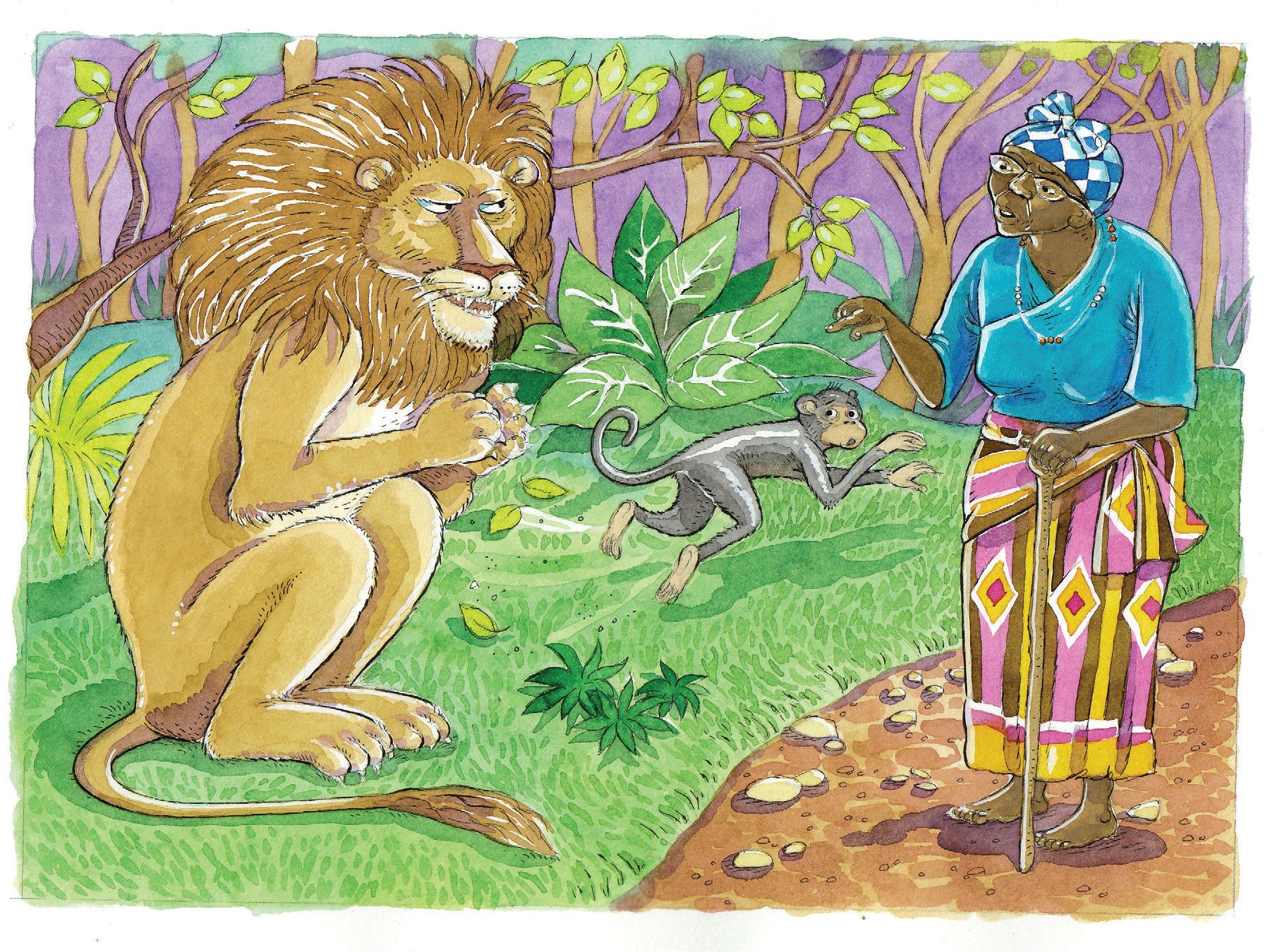
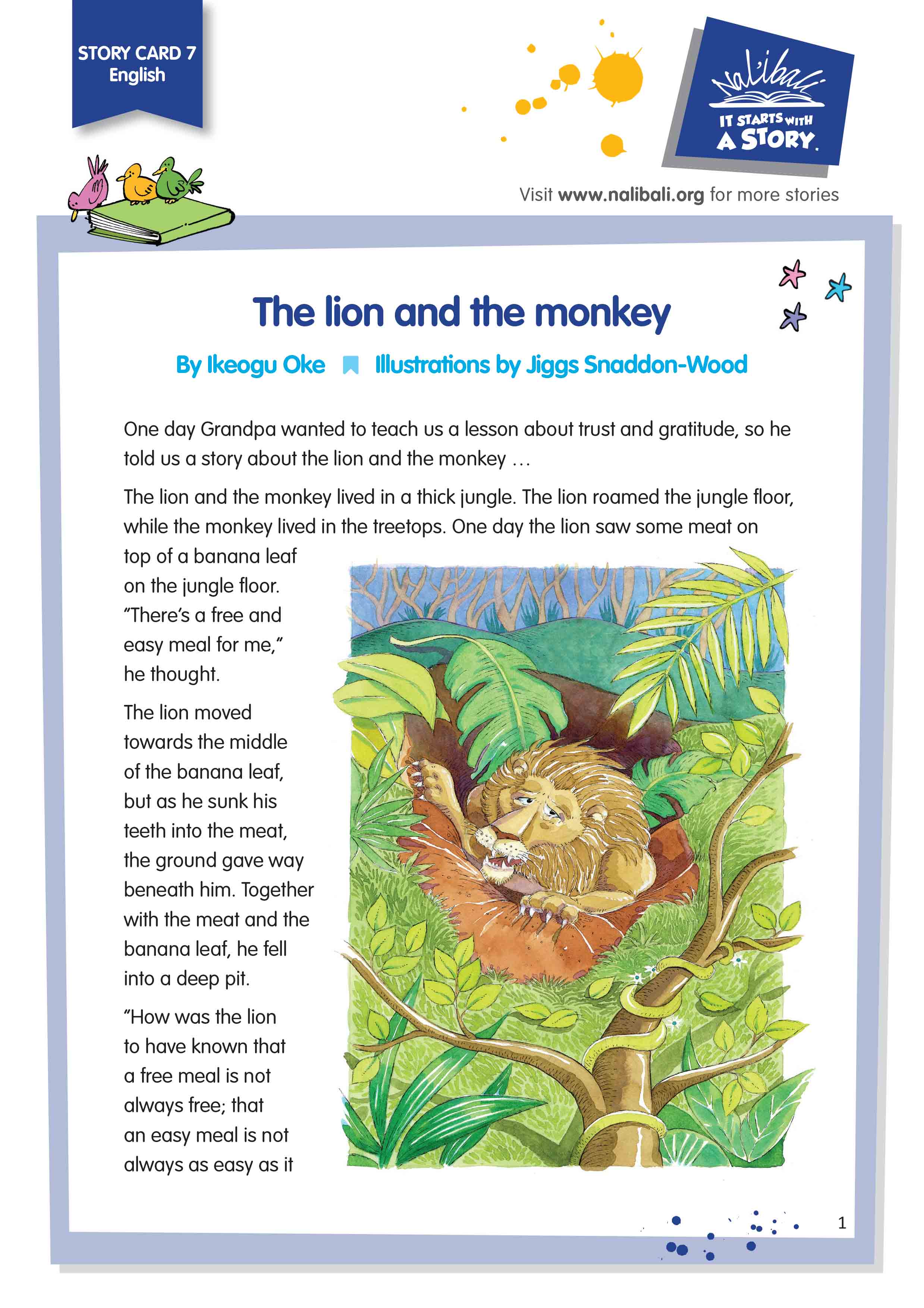
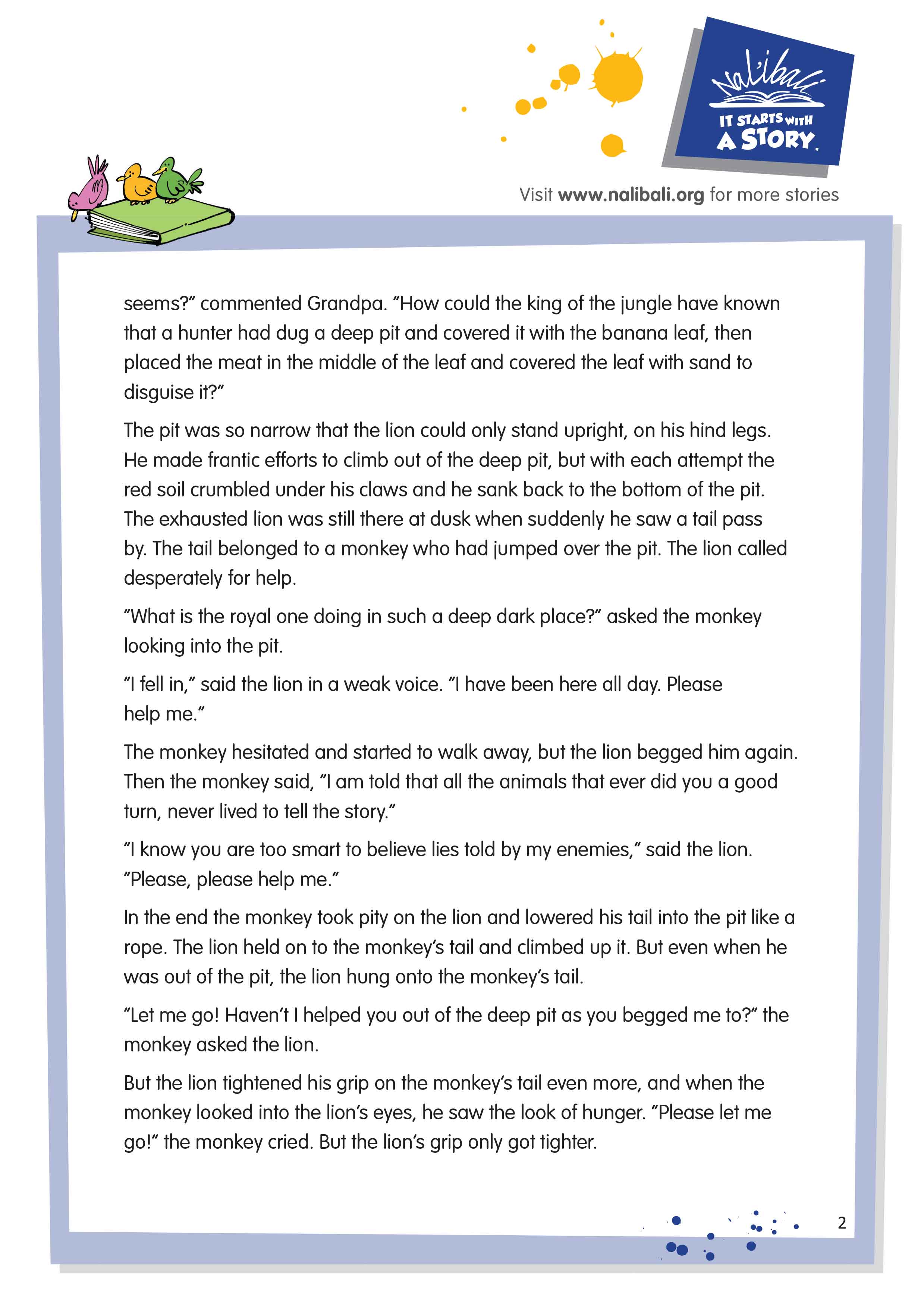
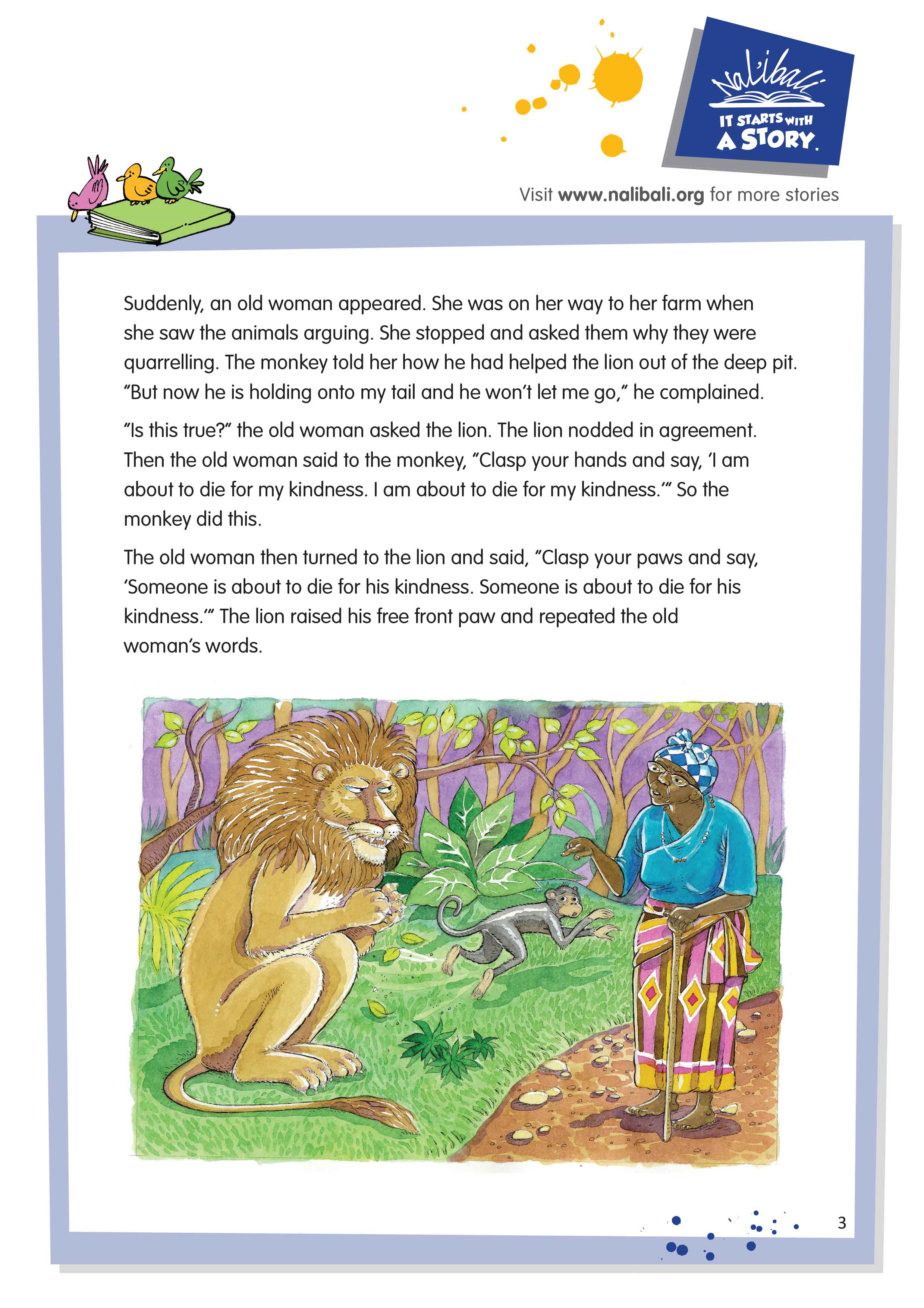
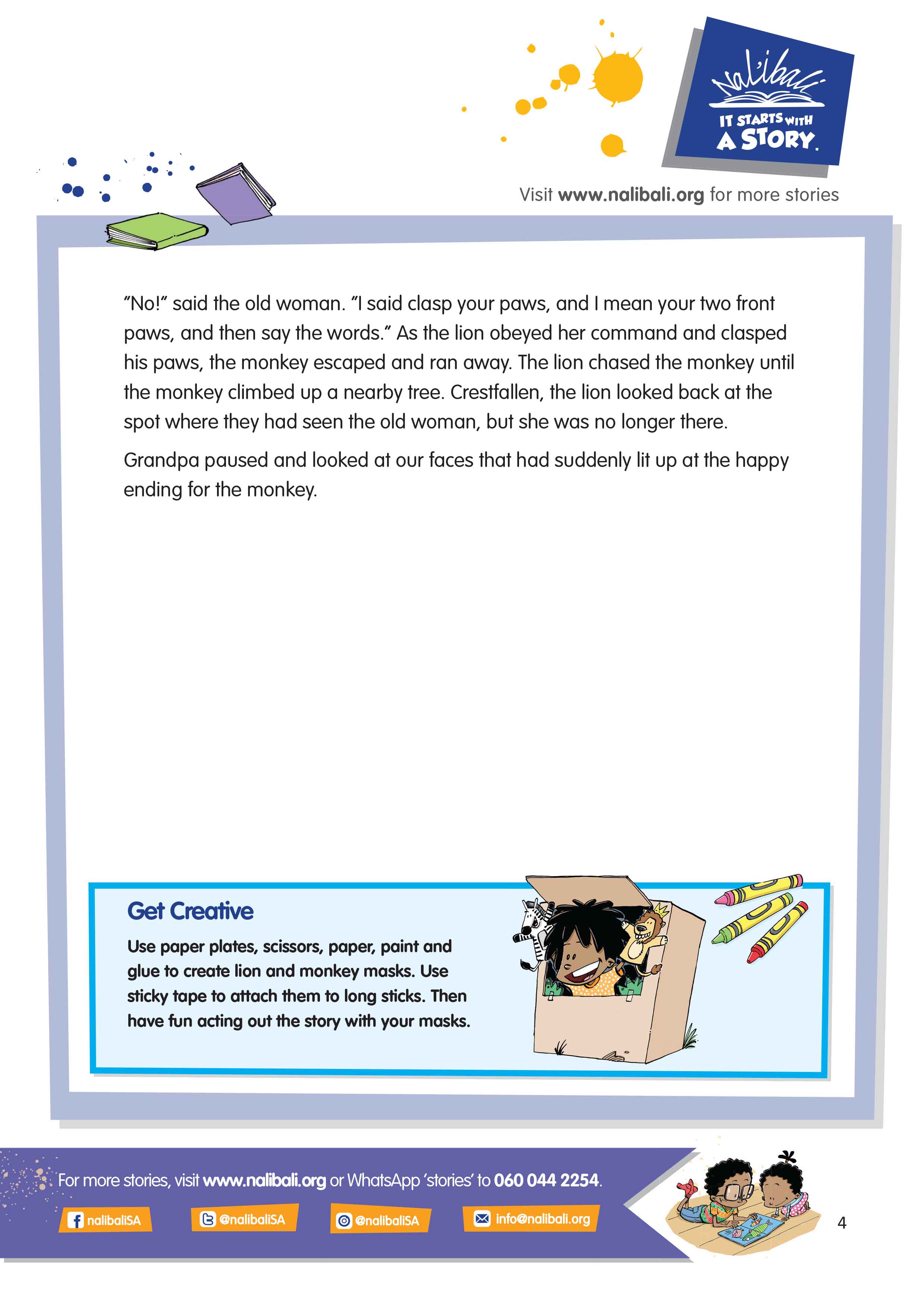




The Birthday Wish
By Michelle Friedman
Illustrations by Alzette Prins
“Oh dear,” thought Lethabo’s mama as she sat at the kitchen table. “What shall I do? Tomorrow
is Lethabo’s birthday and there’s very little money to buy a present.”
Lethabo stood at the sink humming as she washed the dishes. “Mmmm la la ... Mmmm la la.”
“Lethabo,” said Mama, “it’s your
birthday tomorrow. What can I
give you?”
“Oh, Mama,” said Lethabo, “I
don’t know what I want.”
“I’ll think of something,”
Mama said.
Dum dum de dum ... dum dum
de dum. Mama’s fi ngertips
touched the table top. Lethabo
liked the sound. “Dum dum de
dum … dum dum de dum,” she
sang quietly as she went into
her bedroom. She took off her shoes and sat on her bed. “What do I want for my birthday?”
Lethabo said aloud.
“Funny you should ask that!” said a voice.
“Who’s there?” said Lethabo standing up. “I don’t see anybody.”
“I’m under the bed!” said the voice.
“Please come out!” Lethabo jumped back on her bed. “Eeek!”
There, in front of her, stood a spider. He stood on eight long legs. They looked like sticks.
“I’m so sorry I scared you!” The spider bowed his head. “My name is Felix. I’m an Anansi spider.”
“I’m Lethabo. I like your hat!”
“Thank you, Lethabo. My hat
comes from Ghana! It’s the colours
of the flag of Ghana − red, yellow
and green.”
“Where’s Ghana?” asked Lethabo.
“It’s very far away in Africa,”
answered Felix.
“What’s an Anansi spider?” asked
Lethabo.
“I’m from the family of Anansi
spiders. We’re famous. We’re from
West Africa. Some of us get into
trouble a lot, but I don’t. Well, not
often anyway,” laughed Felix.
“Why are you here?” Lethabo asked.
“You called me,” said Felix.
“But I didn’t call you!” said Lethabo.
Felix chuckled. “Yes, you did, when you hummed a tune. Now, please close your eyes, I have a
surprise for you.”
Lethabo put her hands over her eyes. She could hear Felix scuffling around on the floor.
Then
a sound filled the room. Dum dum de dum … dum dum de dum. It was like the noise her
mother had made on the table top, but closer and louder.
“Oh what can it be?” she cried.
“Open your eyes!” shouted Felix.
Felix was playing eight drums at the same time. Each tiny foot was on a drum. The drums
were in a circle around him. His head was bent as he beat each drum. Dum dum de dum ...
dum dum de dum.
“Oh I love it!” Lethabo beamed. She jumped around the room singing as he played.
The sound of the drums and Lethabo’s singing filled the small room. It bounced off the walls,
rose to the ceiling, dropped onto the carpet, wriggled inside their bellies, tickled their toes and
joined the beat of their hearts.
“Lethabo, are you
okay?” Her mama’s
face peered round
the door.
“Oh yes, Mama,” said
Lethabo. “I was just thinking
about my birthday.”
Lethabo’s mama closed the
door and went back to the
kitchen. “Oh dear, what am I
going to do?” she said.
“Felix! Where are you?”
Lethabo looked under the
bed. “You can come out now.”
“That was close!” said Felix. “Grown-ups like to chase me.”
“Please tell me why you came to see me,” said Lethabo.
“Well, I know it’s your birthday tomorrow. What do you want?” asked Felix.
“A drum, Felix! I want a drum!” Then Lethabo felt sad. “But it’s too late. The shops are closed.”
“Hee, hee,” chuckled Felix. “Just ask your mother for a drum. Ask for a drum from West Africa.
Now close your eyes again and make a wish. Goodbye, Lethabo!”
Lethabo closed her eyes, “I wish I had a drum,” she said. She opened her eyes. Felix was gone.
“Mama! Mama!”
“What’s the matter, Lethabo?” asked Lethabo’s mama as she ran into the room.
“Mama, I’d like a drum for my birthday!”
“But Lethabo − a drum?” Her mama shook her head.
“Not just any drum, Mama. A drum from West Africa, please.” And she sang as she danced
around her room. Dum dum de dum!
Lethabo’s mama listened to the singing. She thought about her father. She remembered him
sitting outside their hut in the sun. Between his legs stood a big drum. He was beating it,
calling all the men and women of the village to a feast. A fi re was blazing. He was smiling at
Lethabo, his new granddaughter, as she lay in her mother’s arms.
“Oh, how I miss my father,” Mama thought. “But wait a minute! I still have some of his things in
the suitcase under my bed.”
Mama found the old suitcase under the bed. “Oh, no, there are spiders on it!” Mama
complained.
At the sound of her voice, the spiders scuttled away. Mama pulled the suitcase out and
opened it. Inside she found a small drum − just the right size for Lethabo.
“Oh, thank you, Father! I remember this drum! You made it for Lethabo!”
There wasn’t a sound
coming from Lethabo’s
bedroom. Quietly, Mama
tip-toed to the bedroom
and opened the door. The
light from the moon shone
on her daughter as she
slept. Mama put the drum
on the floor next to the bed
and kissed Lethabo’s cheek.
“Happy birthday, Lethabo,”
she said quietly. “Happy
birthday from me and from
your grandfather.”
Get Creative
Follow the instructions to make the spider from the story.
1. Cut off one cup from a cardboard egg carton.
2. Make a small hole on the left and right side of the cup.
3. Paint the cup black and let it dry.
4. Thread four thin strips of black paper through each hole to make eight legs.
5. Use some paper or cardboard to make a red, yellow and green hat for your spider.
Download the story cards below:
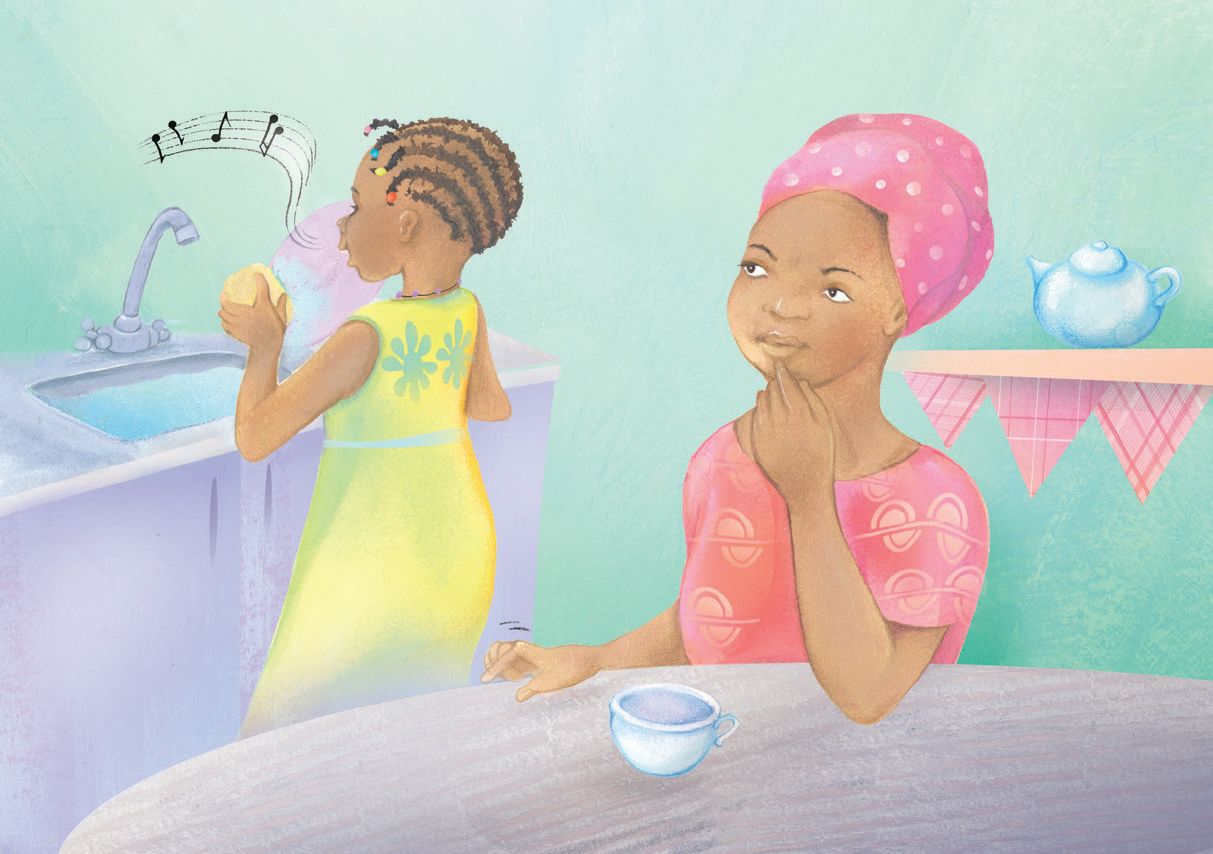
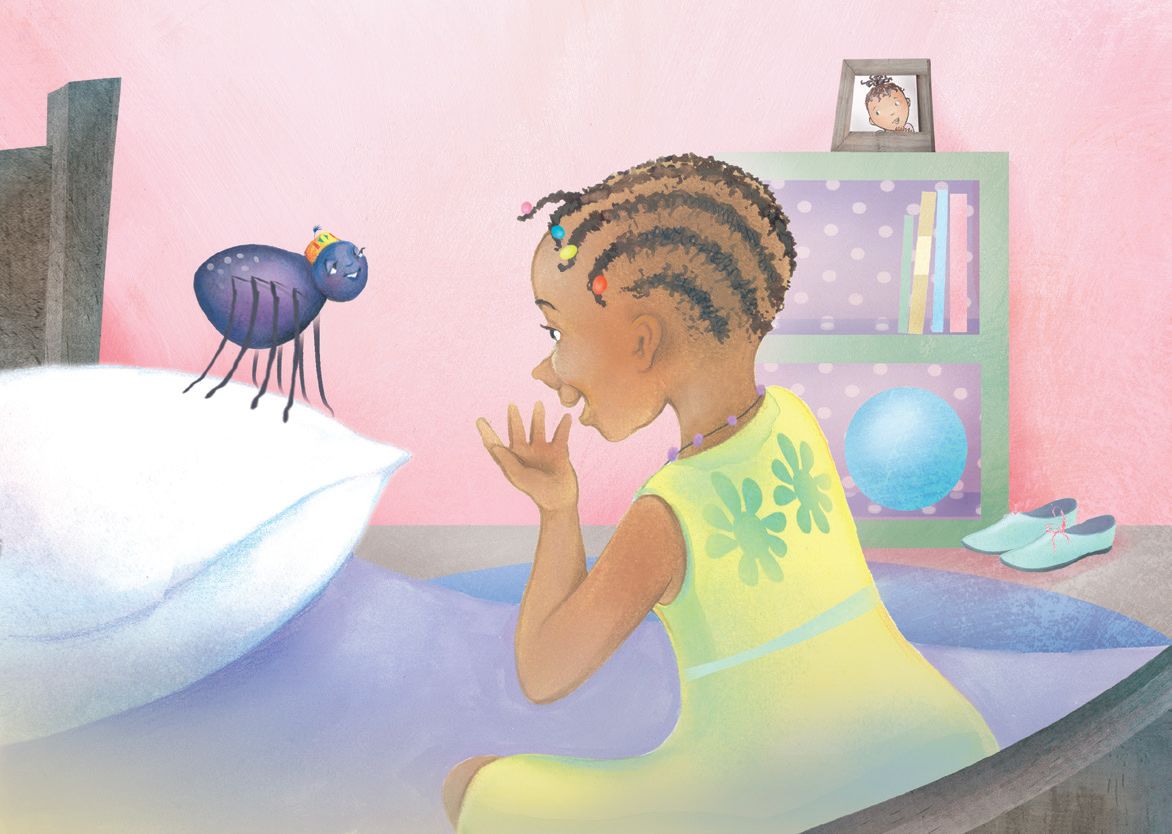
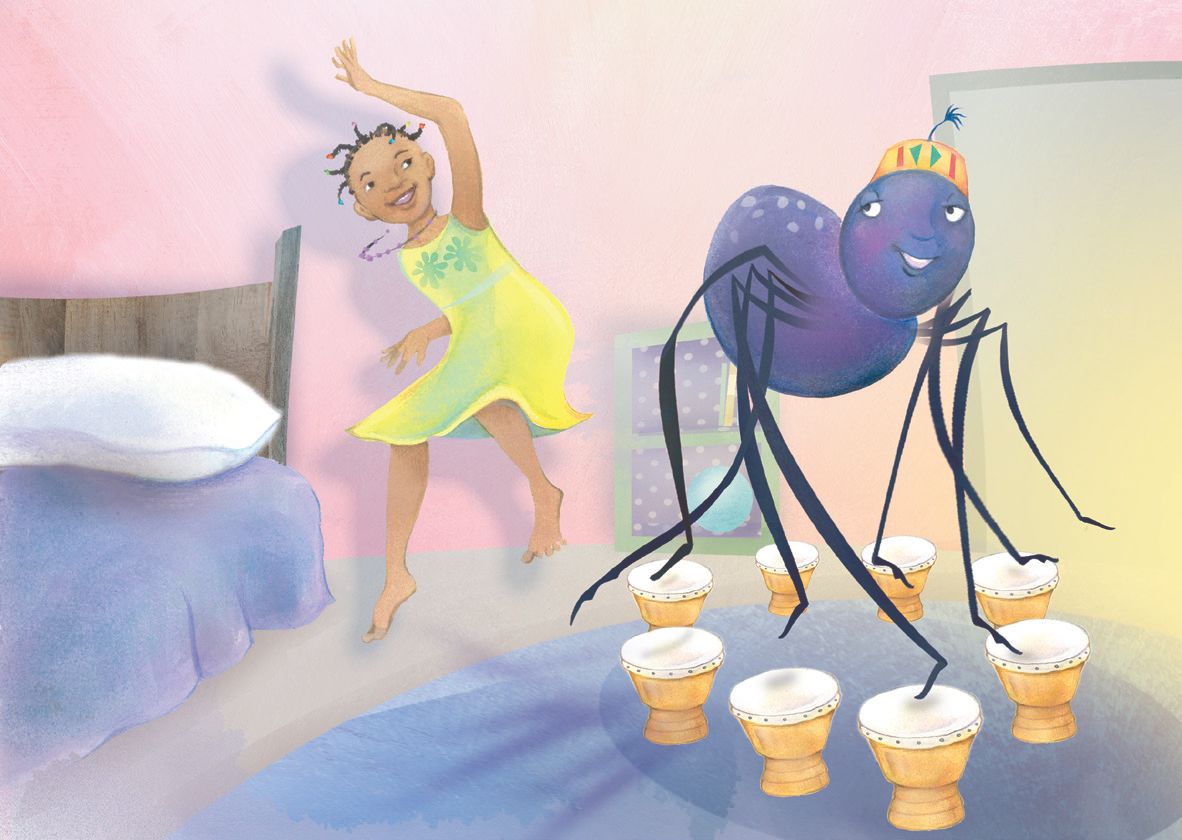
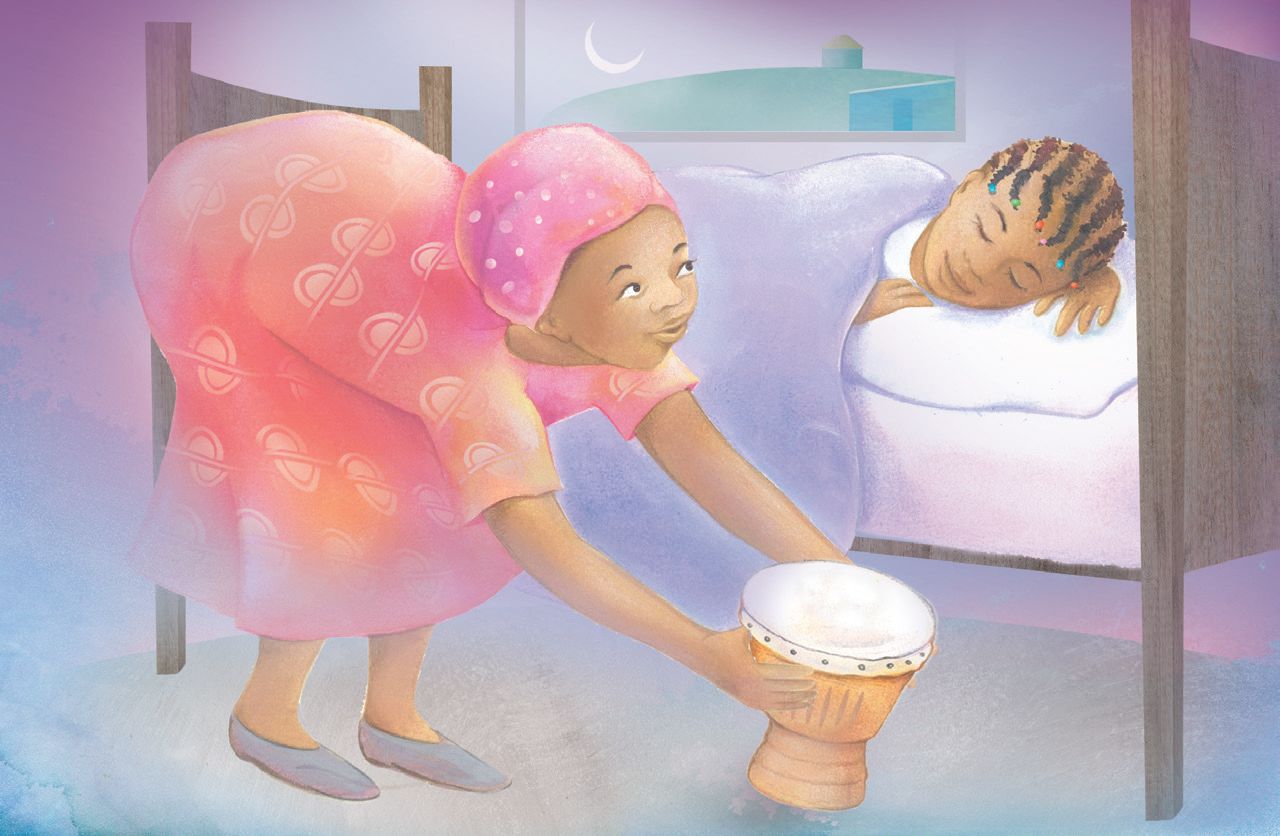
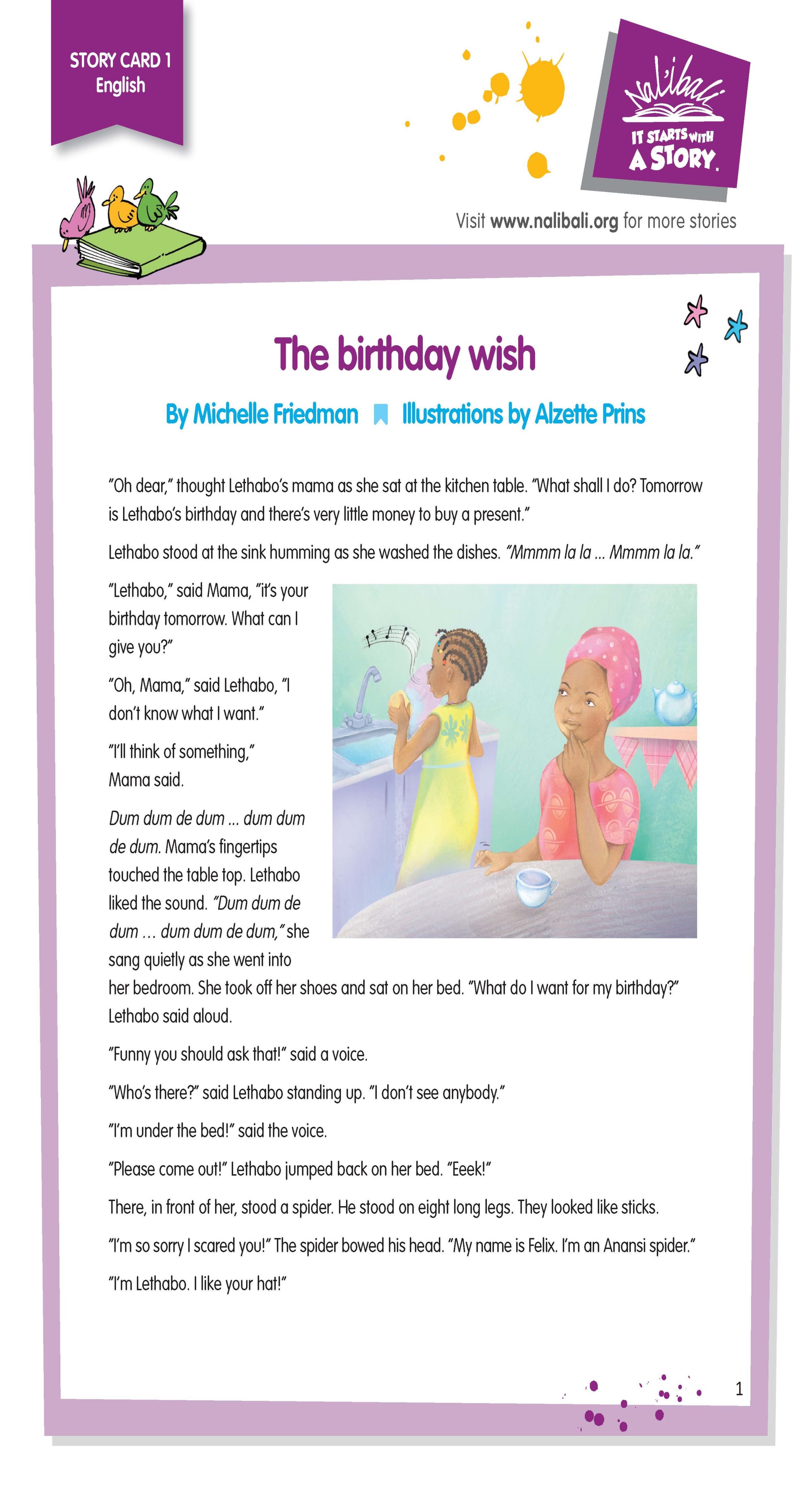
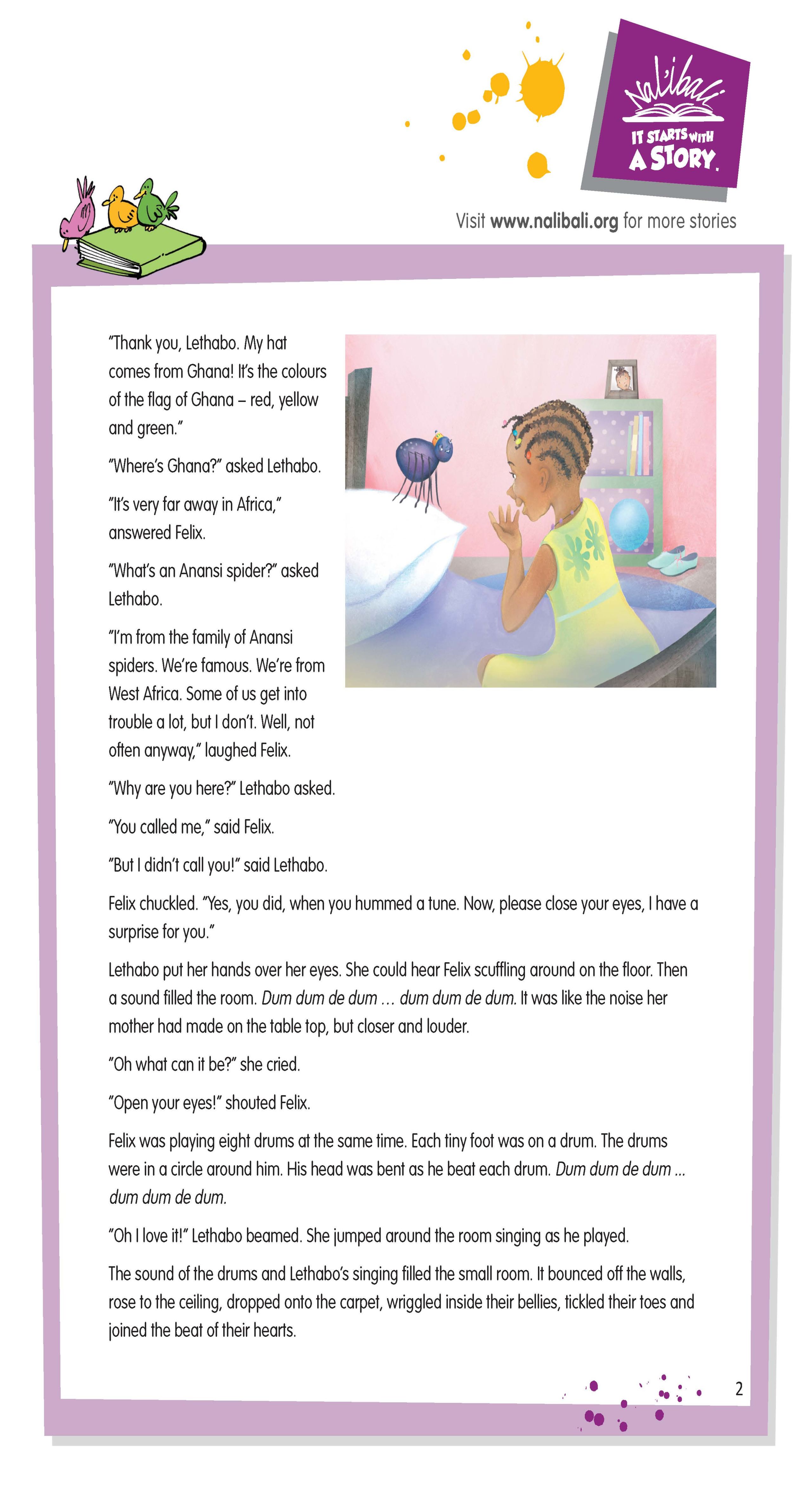
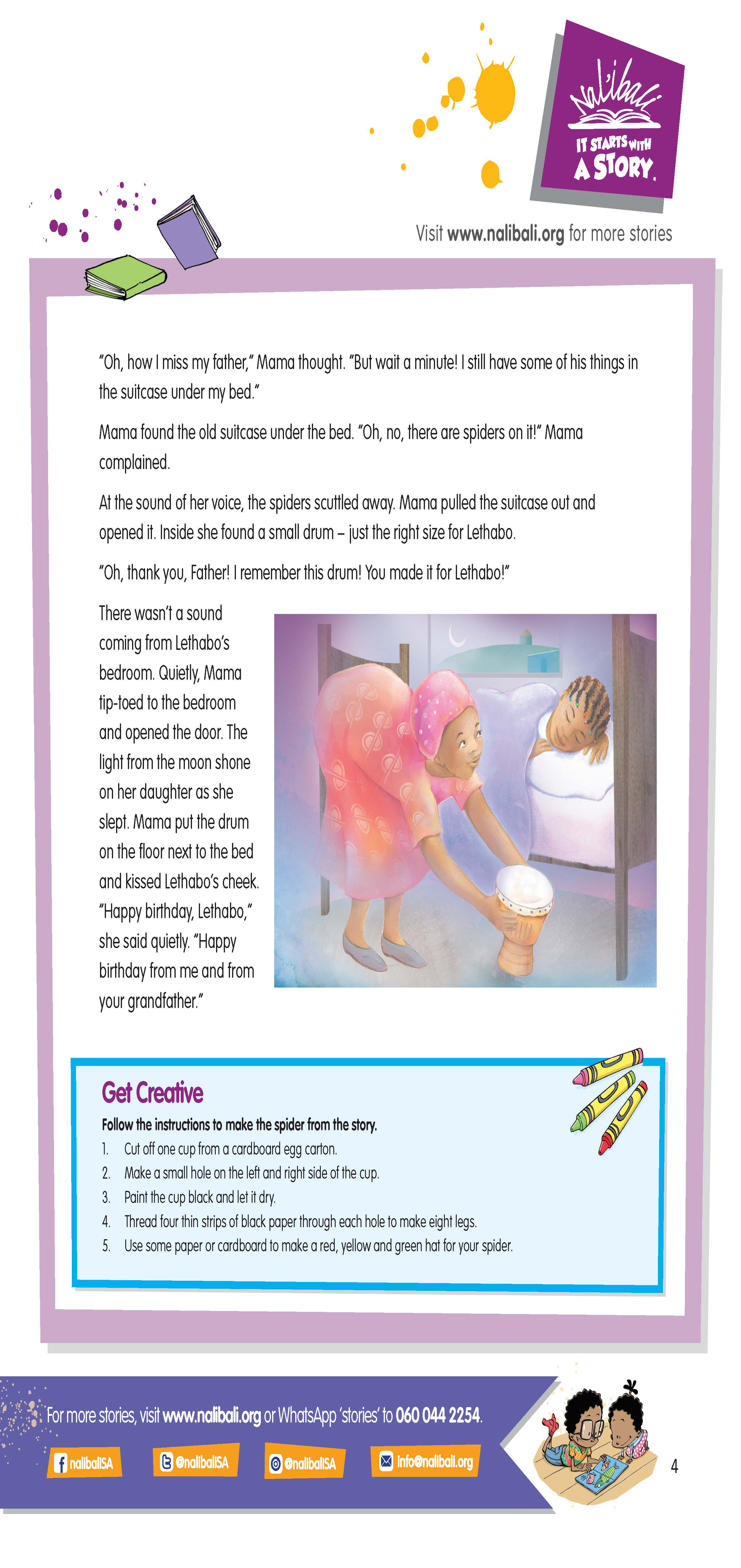



Feleng learns to read
By Joanne Bloch
Illustrations by Anita Sent
Feleng the fishmoth loved stories. “Mama,” he said every night, “please tell us a story. I promise we’ll go to sleep straight afterwards. Please, please, please!” Mama Fishmoth only knew one story, and she was a bit tired of telling it. But Feleng and the other fishmoth children begged so much that she always gave in. She told them about her adventures in the kitchen. She spoke about her long journey there, and about all the big, strange things she had seen in the cupboards.
“Humans use so many things, like cups and plates and spoons,” she said. “Humans are very strange!” The best part of the story came when Mama Fishmoth told the children about all the food she had tasted. “There were breadcrumbs, apple peels, delicious lumps of porridge and grains of sugar behind the stove …” she said.
“Yum!” they murmured in dreamy voices. “Yum, yum!” But soon their eyes grew huge. She had reached the terrible part of her story – the day a human had tried to squash her. “I ran for my life!” said Mama Fishmoth, rolling her eyes, and all the fishmoth children shivered and moaned and twitched their feelers … That meant it was time for bed. One day, Mama Fishmoth told her children to go out for lunch. “Feleng, you are the oldest,” she said. “Please take good care of your sisters and brothers.” Fishmoths don’t eat every day, so the little fishmoths were very excited. Impatiently they waited until the humans had left and the house was quiet. Then one by one, they slid out of the crack in the wall where they lived.
“Follow me,” whispered Feleng. “Do exactly what I do.” Up, up, up the leg of a huge table they slithered. On the table were three or four open books with paper and crayons scattered about. “Look at all this tasty food, just lying here waiting for us!” chuckled Feleng’s sister Phuti. “It’s a good thing the human children are so messy!” “Yum!” said all the fishmoth children as they climbed into the spine of one of the books. “Yum, yum!” But suddenly, Feleng spoke. “Don’t eat the books,” he said. “Eat that instead.” He pointed to a crumpled up drawing. “That will be tastier. There’s lovely crayon on it.” “Oh, all right,” said his brothers and sisters. They were too hungry to fight with him. Soon they were all busy nibbling at the drawing – all except Feleng.
First, he stared at the black squiggles and the bright pictures on the open pages of the book. Then he climbed up into it, and began to move slowly and carefully from squiggle to squiggle. At first, his brothers and sisters were too busy munching to notice what he was doing. But after a while, his little sister Fifi looked up. “What are you doing, Feleng?” she asked in her high, squeaky voice. “Why aren’t you eating?” Feleng just smiled. “You wait and see,” he said. “I’ll tell you later.” That night, when the little fishmoths were cuddling up to their mother in the crack in the wall, Feleng started to speak.
“I know what you want!” said Mama Fishmoth. She was in a good mood after her peaceful day alone at home. “You want me to tell you a story.” Feleng grinned. “Not tonight,” he said. “Fifi , tell Mama what I did today.” When Mama Fishmoth heard how Feleng had moved along the squiggles in the book while the other children were eating, his mother was a bit worried. “What were you doing, Feleng?” she asked. “All children need to eat, you know.” “I can eat tomorrow,” said Feleng. “Today I did something even better – I learnt how to read!” Then he explained how he had looked from the black marks on the page to the pictures. “I realised they were telling me something,” he said. “After some time, I started to understand what the squiggles meant … they are letters, and letters make words. And words make sentences, and sentences make stories. So tonight, you can rest, Mama – tonight it’s my turn to tell YOU a story!”
With that, Feleng told his mother and brothers and sisters a story about a human child who went down to the river and met a crocodile. “What’s a river? What’s a crocodile?” shouted the little fishmoths. “I don’t know,” laughed Feleng. “I’ll have to find out tomorrow. But the picture showed a huge, scary creature with a very big mouth.” “Like a human!” said Mama with a shudder, and all the fishmoth children shivered and moaned and twitched their feelers … That meant it was time for bed.
Download the story cards below:
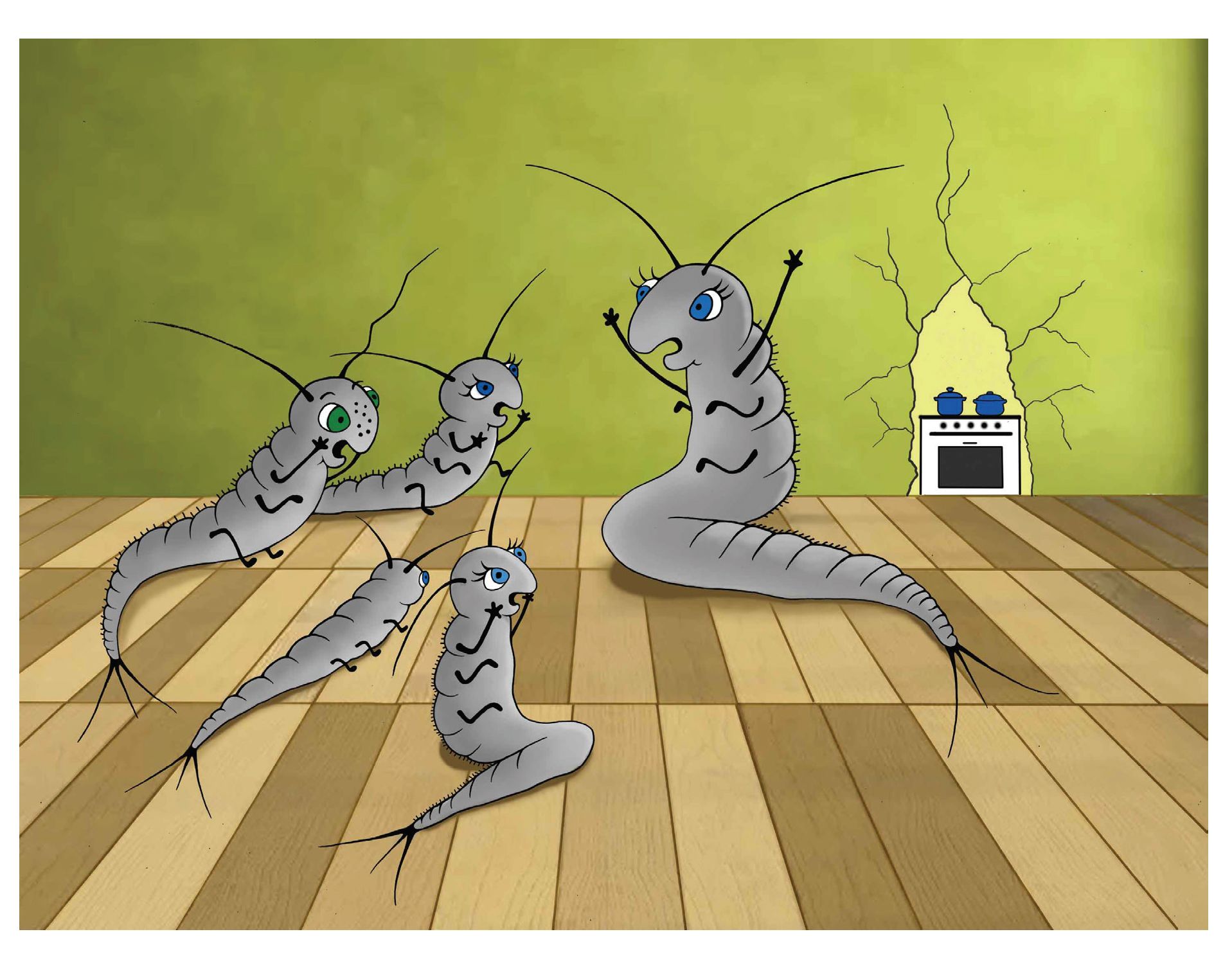
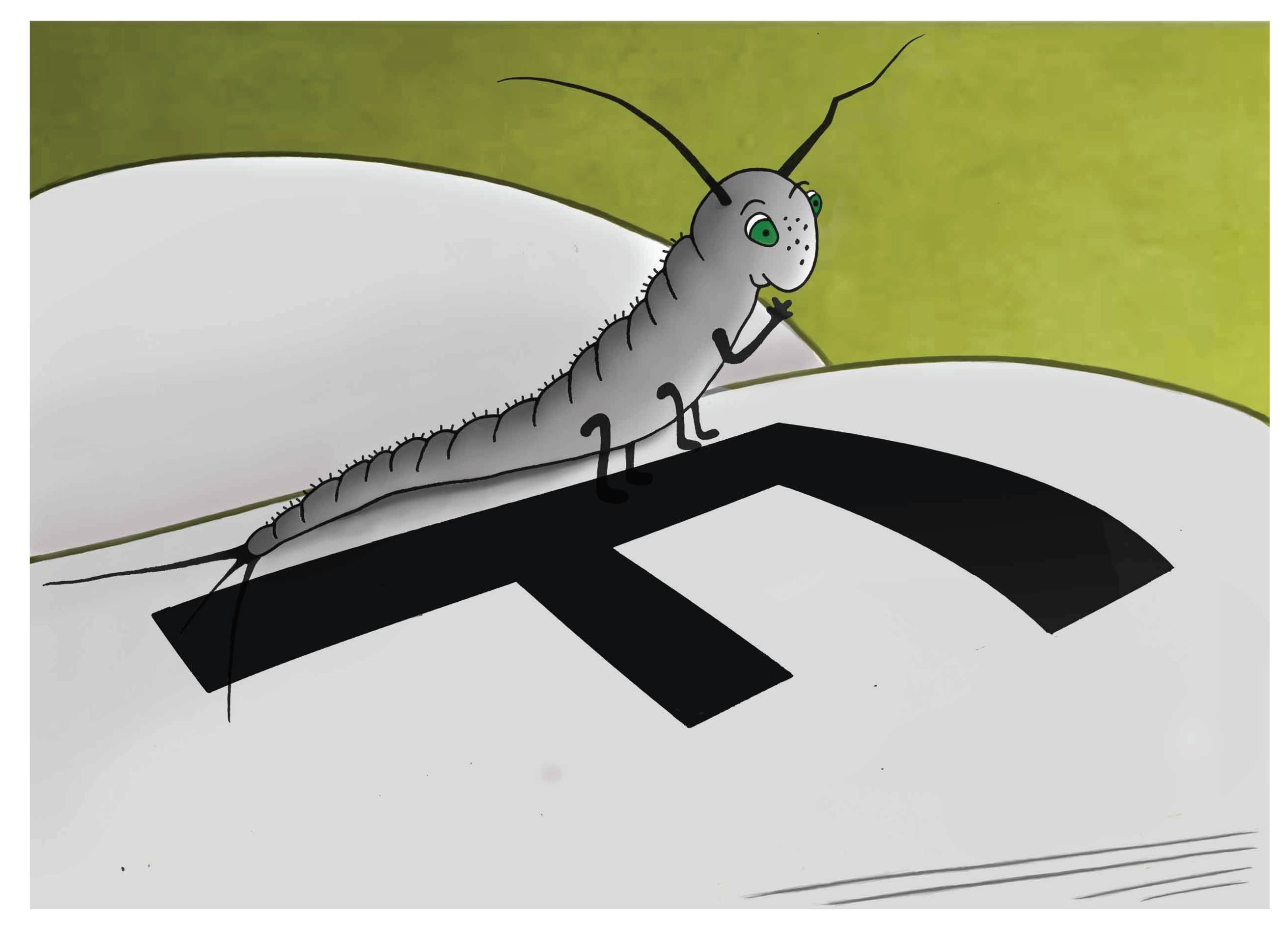
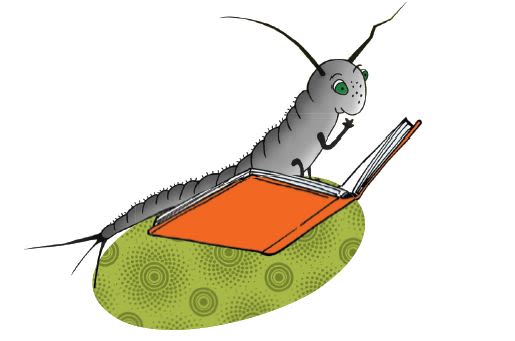
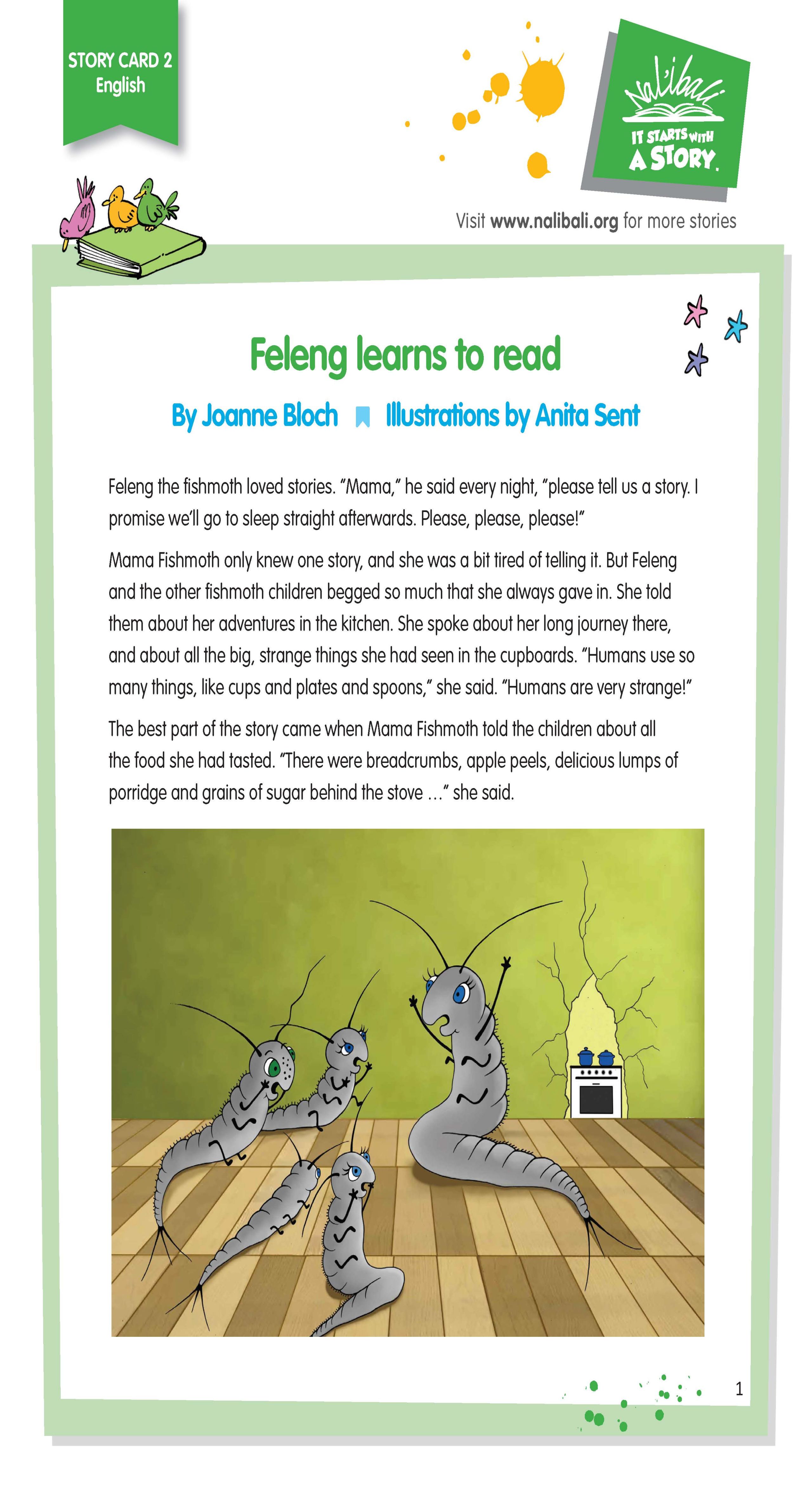
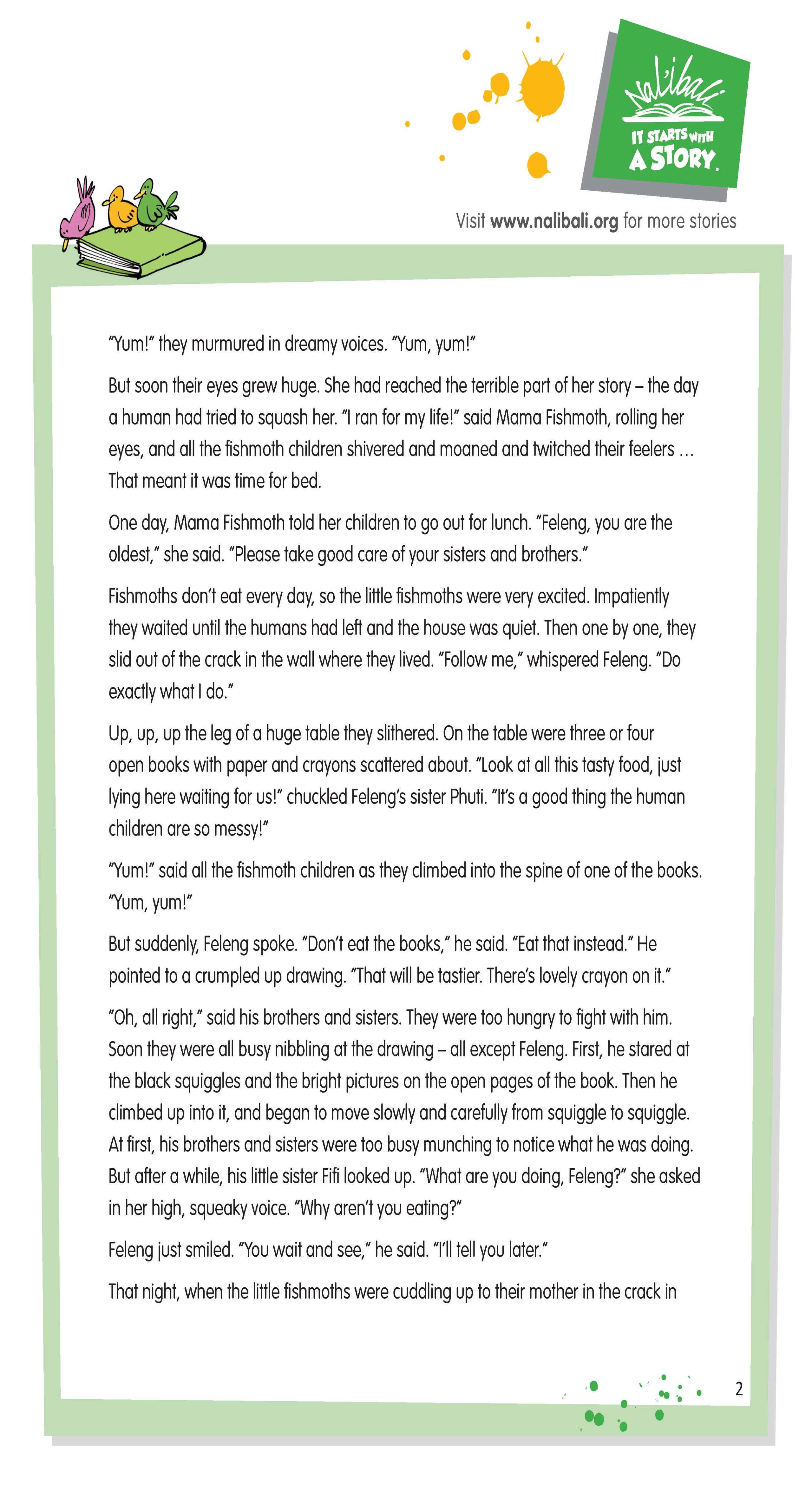
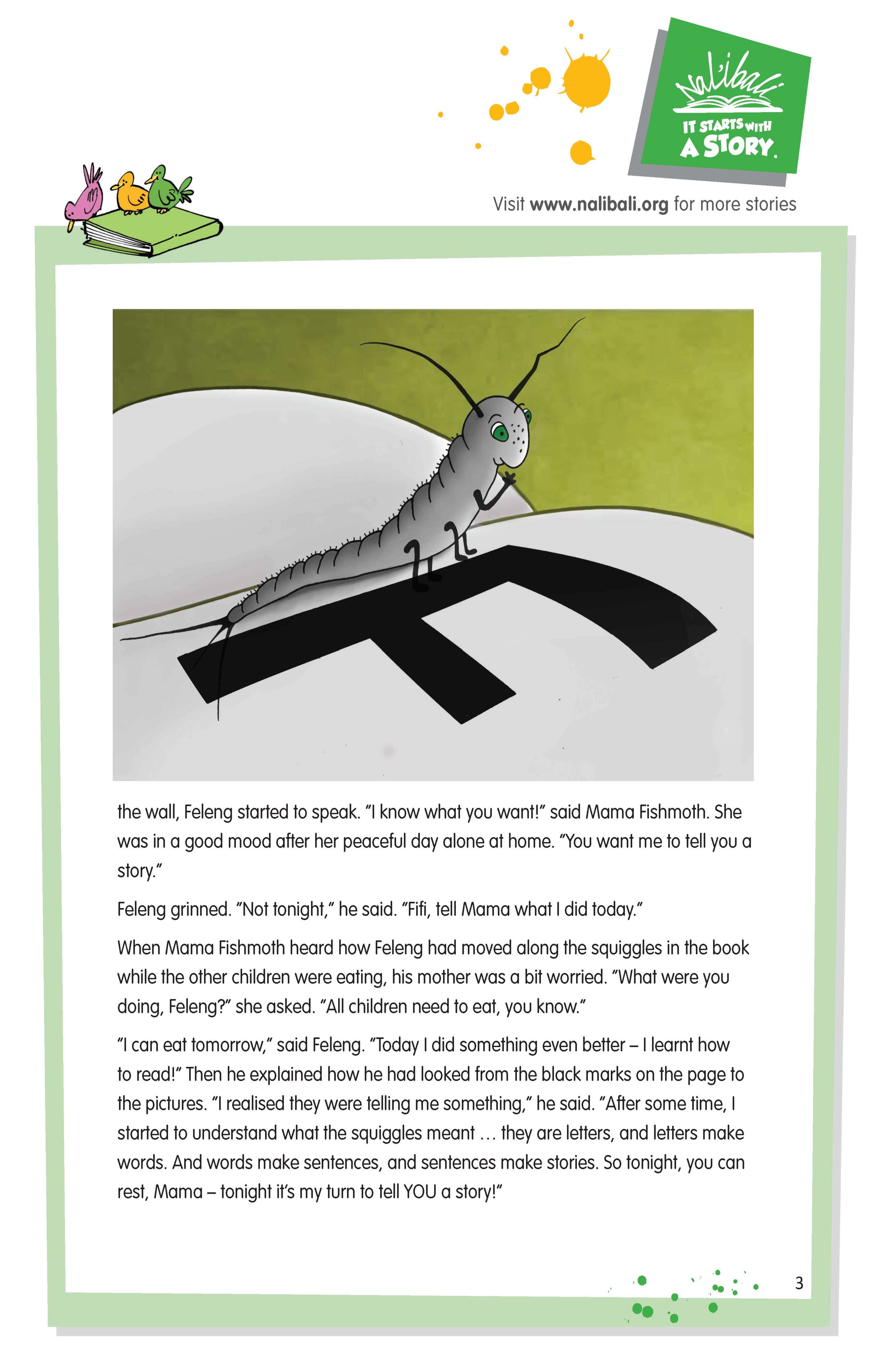
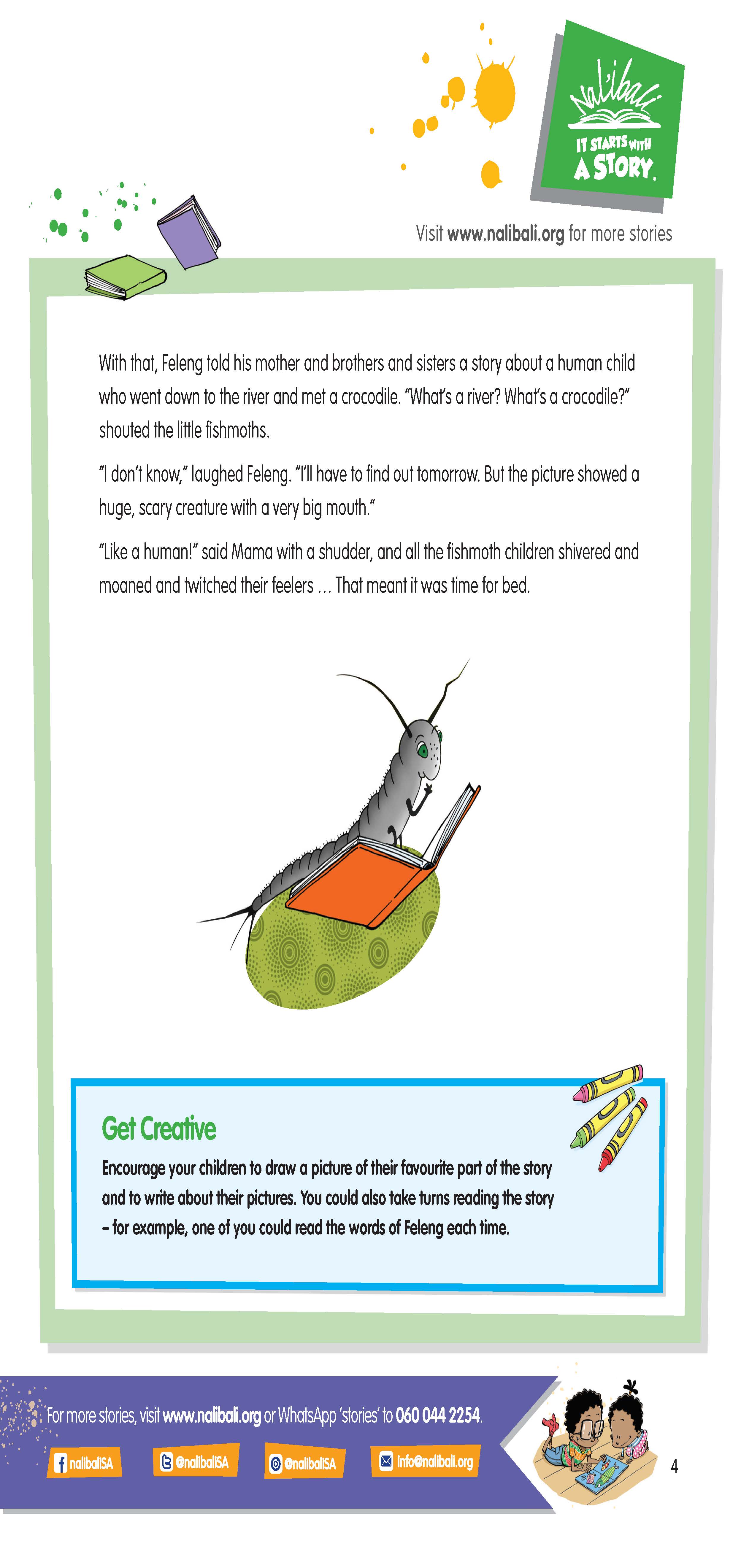




The hare and the hedgehog
Retold by Elaine Ridge
Illustrations by Mieke van der Merwe
Many years ago there was a hare that could run faster than any other animal on the
farm. He was very, very proud that he could run so fast. He could not help reminding
the other animals what a fine runner he was.
“I am faster than the wind,” he boasted again and again to his friend, Hedgehog.
One morning Hare and Hedgehog met at the gate leading to a field on the farm. It did
not take Hare long to boast, “I am the best runner in the world. I am faster than the
wind.”
“I don’t think so,” said Hedgehog fi rmly. “I think even I could run faster than you.”
“A slowcoach like you?” Hare laughed nastily. “You don’t have a hope of running faster
than me.”
Hedgehog thought for a bit. Then he spoke quietly, “All right. Let’s see who’s faster. We
can race against each other tomorrow. We will run from this gate to the bottom of the
field and back again.”
“Fine,” said Hare. “I won’t even have to run to beat you, old Short Legs.”
“You’ll see,” said Hedgehog. “You don’t have to have long legs to win a race, you
know. I’ll meet you at this gate tomorrow, just after sunrise. I will win the race. You must
promise me that when I do you will never call me Short Legs or Slowcoach again.”
“All right,” agreed Hare, very sure of himself. “If you really want to race me, you can. I
promise I will not call you Slowcoach or Short Legs − IF you win. Of course, that’s never
going to happen. I am faster than the wind. I will get to the bottom of the field and
back while you are still thinking about starting. Then I will be able to call you Short Legs
or Slowcoach as often as I like. Ha! Ha!”
Hedgehog told his older brother about the race, “Oh dear,” said his brother, “you have
made a terrible mistake. Whatever made you take on something so impossible? Hare
is faster than the wind. Now he will be able to call you Slowcoach and Short Legs for
the rest of your life.”
“Don’t worry,” said Hedgehog. “I have a plan. A very clever plan. If you help me, we
can teach Hare a lesson. He will have to stop boasting − and he will never be able to
call me Slowcoach or Short Legs again!”
The next day Hedgehog got to the gate long before Hare. As usual, it took Hedgehog
a long time to get there, but he was waiting with a smile on his face when Hare
bounded up just before the sun peeped over the hill.
“Good morning, Short Legs. Are you sure you still want to race me? You know you
haven’t the slightest chance of winning. Are you ready to be beaten? Remember, I can
run faster than the wind,” said Hare.
Hare was so sure that he was going to win that he had even been thinking up some
new names to call Hedgehog after the race. This was going to be fun.
Hedgehog just smiled quietly. He stood calmly waiting at the starting line. “Let’s just
make sure of the rules,” he said. “We’re going to race to the bottom of the field, and
then back to this gate, right?”
“Yes,” said Hare. Then he shouted, “Ready! Steady! Go!” and bounded away as fast as
he could.
As he got near to the bottom of the fi eld, he couldn’t help chuckling to himself.
“Hedgehog is probably still trying to get started. Oh, he is such a slowcoach.”
Imagine his surprise, then, when Hedgehog popped up cheerfully at the bottom of the
field and cried out, “Got here before you!”
Hare stopped for a moment. Then he turned and ran back faster than he had ever run
before. He didn’t usually puff and pant, but he was puffing and panting and sweating
by the time he touched the gate. He looked over his shoulder. There was no sign of
Hedgehog. This time, he was sure he had won. Then a happy voice came from the
other side of the gate. “Once again, I got here before you!” It was impossible! But there
was Hedgehog, smiling sweetly at him.
Hare could not believe his eyes. Hedgehog had beaten him. He turned away and
walked slowly home with his head hanging down.
But how had Hedgehog managed to beat Hare? The truth is that he didn’t run at all.
When Hare set off for the bottom of the field, Hedgehog hid near the gate. His brother
was already hiding at the bottom of the field. When Hare reached the bottom of the
field, it was the brother who popped up and said, “Got here before you!” Hare was
so surprised that he didn’t even notice that it was a different hedgehog.
When Hare
reached the finish, puffing and panting and sweating, all Hedgehog had to do was to
come quietly out of his hiding place and say, “Once again, I got here before you!”
Hare never boasted again – at least not to Hedgehog. He became a much nicer
friend. He never called Hedgehog nasty names again. And he never found out how
Hedgehog had won the race.
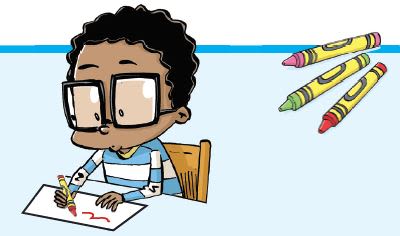
Get Creative
Imagine that you are Hedgehog. Write a
letter to Hare explaining how and why you
decided to trick him.
Download the story card below:
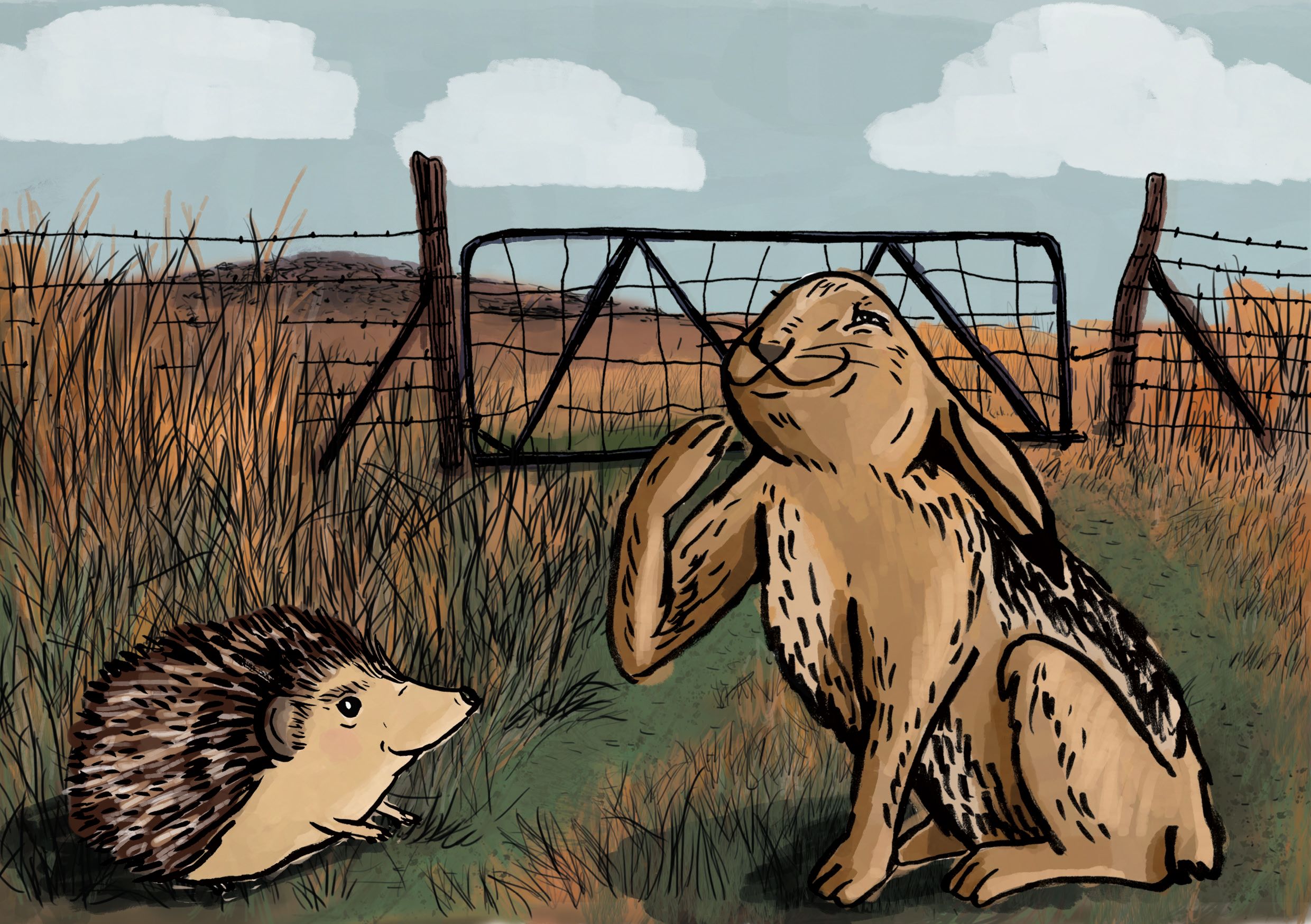
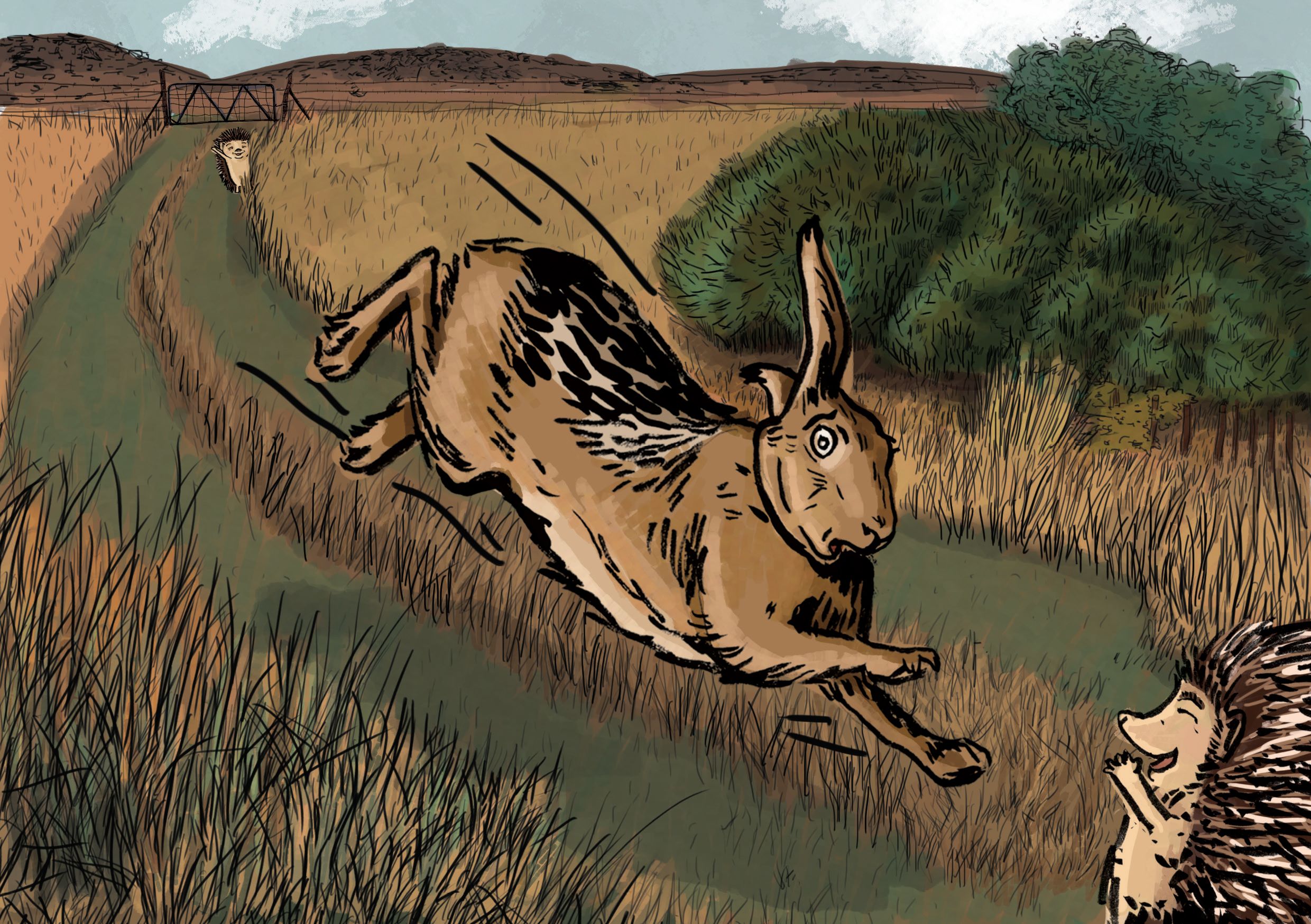
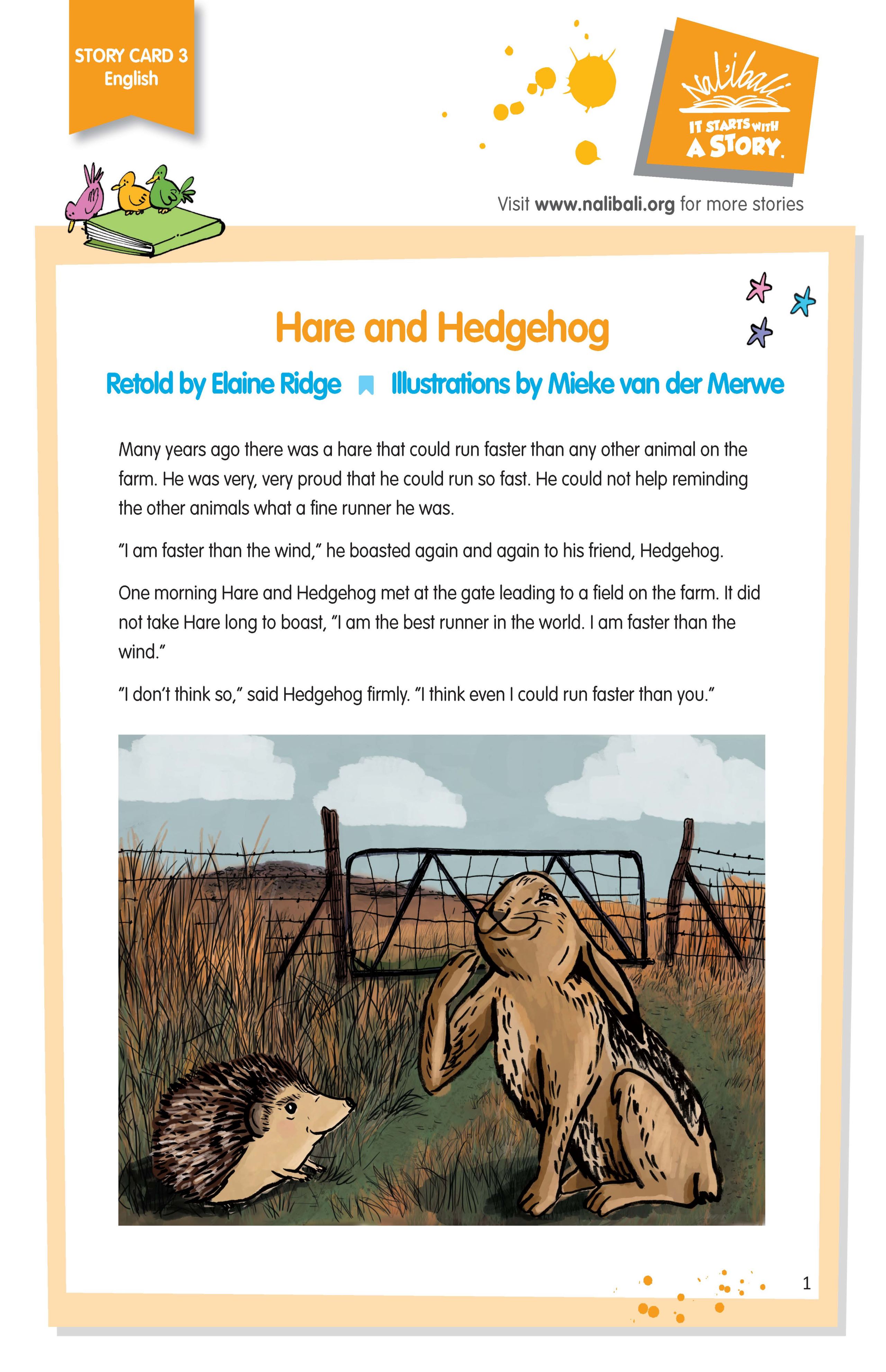
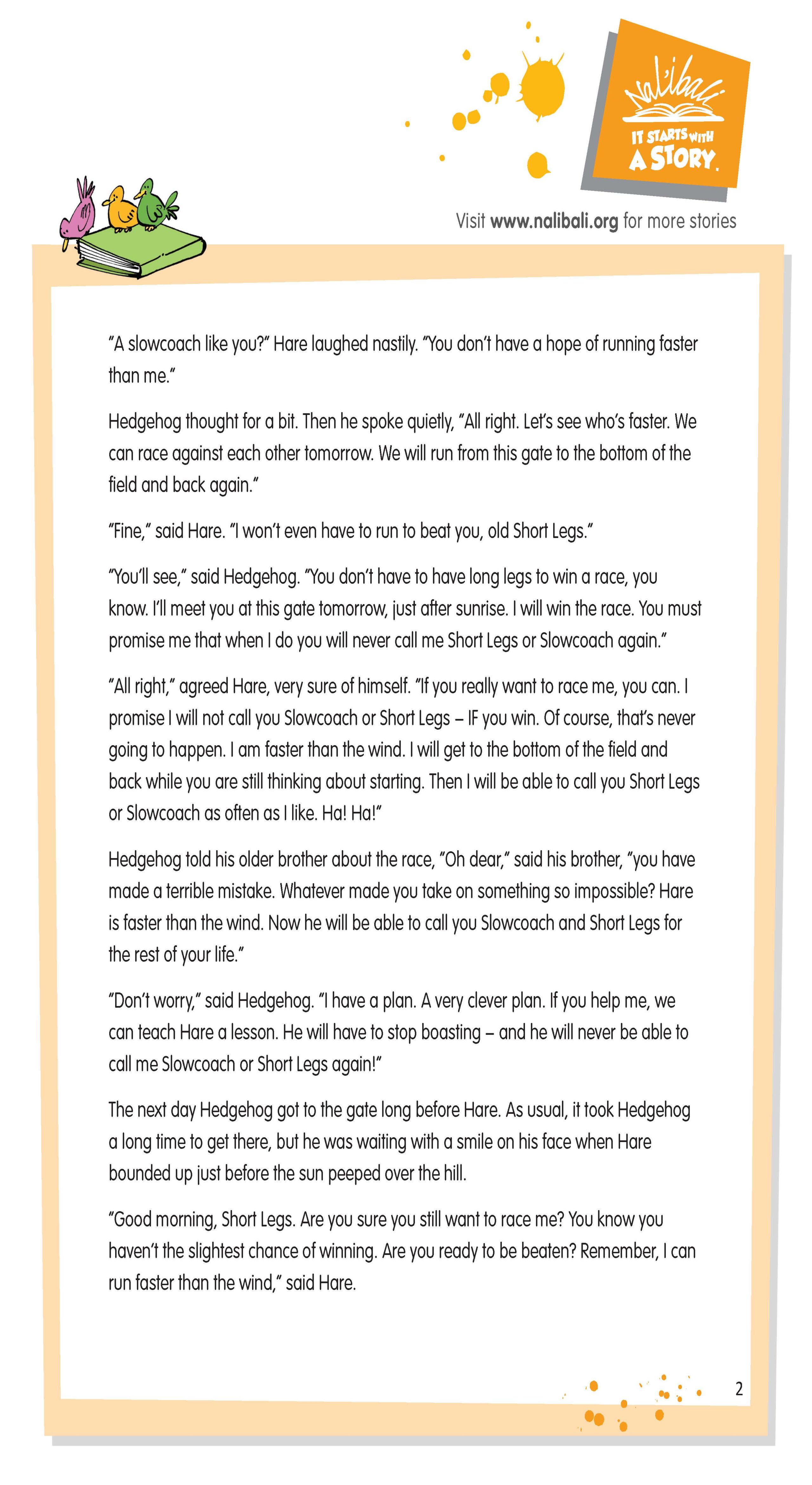
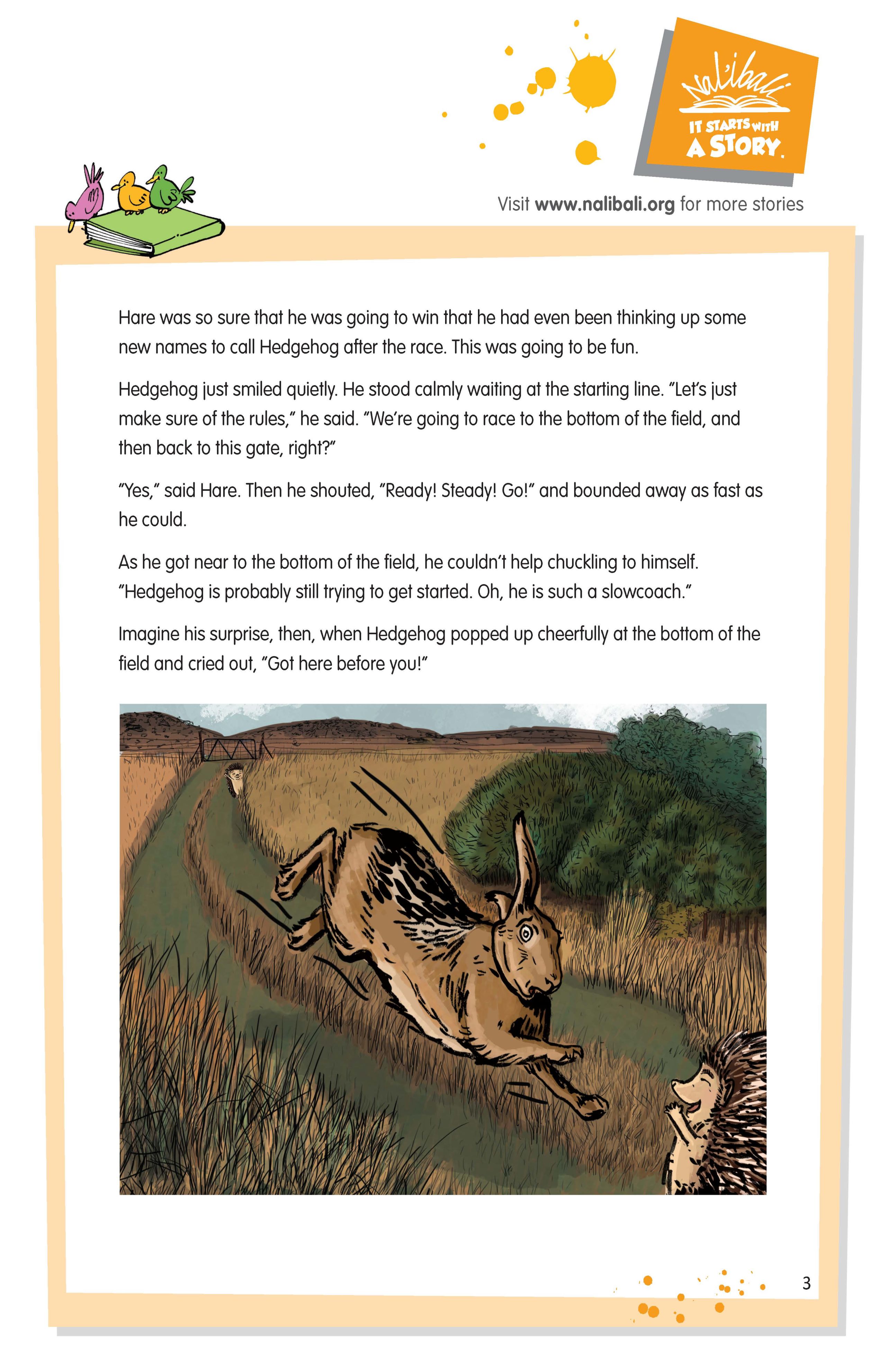
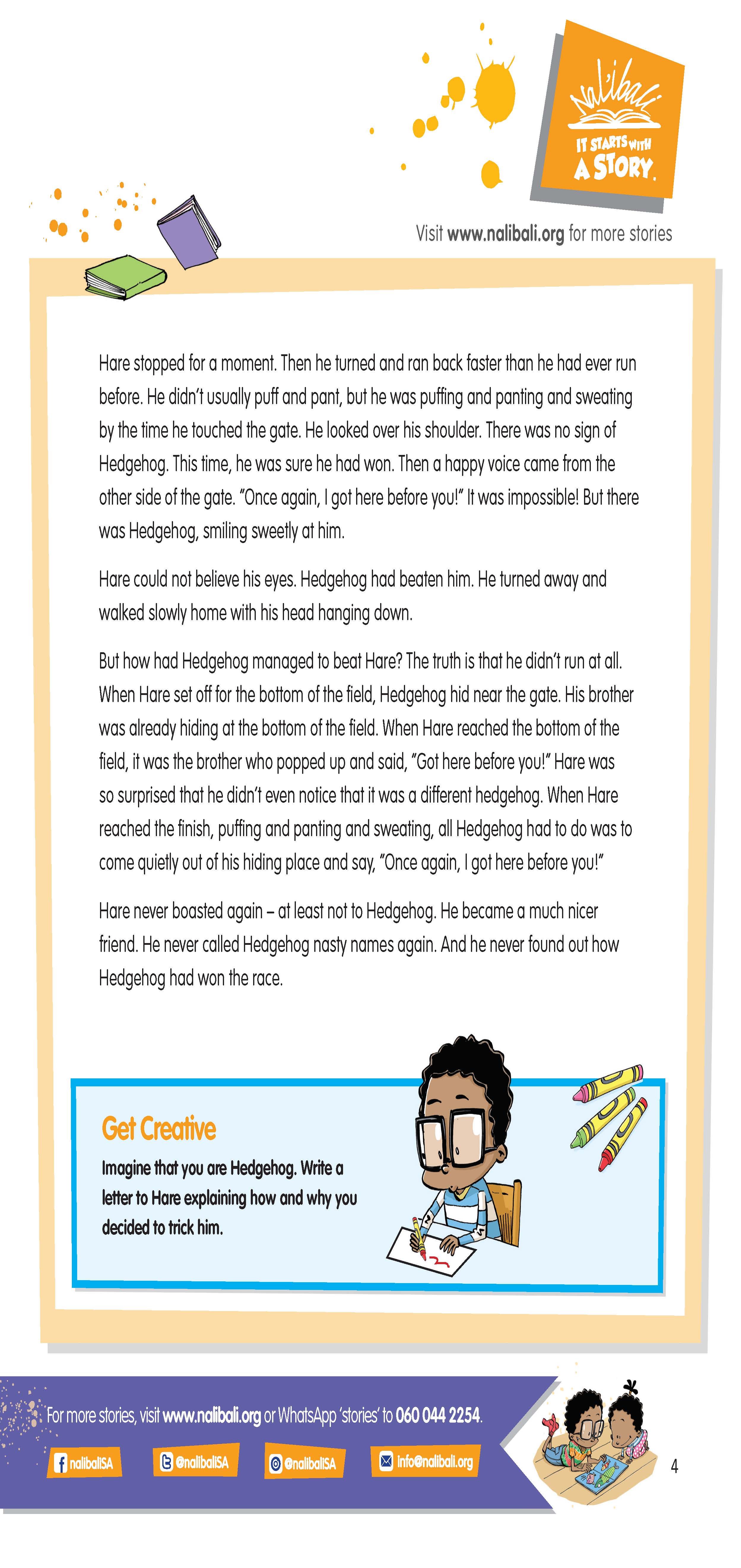




Thembela in the wind
By Leo Daly
Illustrations by Magriet Brink
“Haai, Thembela!” calls Mama. “It’s too windy to be outside. Come in or you’ll catch a cold.” But Thembela doesn’t listen because she’s having too much fun. Her hair lifts up-up-up above her head, and now it’s fl apping all around her ears. Her dress feels like a kite and Thembela is sure that if she wanted to, she could fl y away − right into the sky. “The wind is wonderful, Mama,” she laughs. “I don’t want to come inside.”
“You have to, Thembela,” replies Mama. “It’s no good out there − too dangerous.” Thembela lifts her arms out to her sides and fl aps them up and down like a bird. “Okay, okay,” she smiles. “I’ll come inside.” And with that, she takes a jump. Off she goes across the garden and she feels like she’s fl ying. The wind wraps itself around her and carries her all the way back to Mama, who closes the door behind her. “Shoo, Thembela! Aren’t you tired from all that fl ying? Why don’t you take a warm bath and then it’s straight to bed.” When Mama comes to tuck Thembela in, she says, “Haai, Thembela, you must be the only person in the whole world who likes the wind.” Before Mama leaves, Thembela asks for the curtains to be opened so that she can watch the clouds as they sail on by and the tops of the trees as they sway here-and-there. She kisses her Mama goodnight and falls asleep. That weekend, Mama has to go into the city, so Aunt Ida comes over to stay.
“Oh my,” says Aunt Ida with a great, big sigh, “I heard on the news that there’s a storm on the way!” All day long the clouds gather in the sky until it’s as dark as night. Then the rain starts to fall. Thembela can’t believe her eyes. It’s more rain than she has ever seen and soon there are big puddles everywhere. But Thembela smiles. She pulls on her raincoat and puts on her gumboots and out she goes. “No, Thembela!” cries Aunt Ida. “You come in right now!” But Thembela doesn’t listen because she’s having too much fun. She laughs as the wind blows through her raincoat and fills up her hood like a big balloon. “If I lift my arms,” she giggles, “I could fly!” Then Aunt Ida runs out in her pink dressing gown and carries Thembela back inside. “No one likes the wind,” says Aunt Ida. “It’s loud and it’s cold and it’s just not nice.” When Aunt Ida comes to tuck her in, Thembela asks for the curtains to be opened so that she can watch the trees sway and the clouds sail by. But Aunt Ida says, “No! Definitely no, and no again!” She closes the curtains.
“Now let’s just hope the house doesn’t float away with all this rain,” says Aunt Ida with a shiver. Thembela hears the boom of thunder and the drumming of rain on the roof. Now the wind blows on the walls. It knocks on the door and rattles the windows. It howls down the chimney and gives Aunt Ida such a fright that she hides behind the couch. The roof creaks and the floorboards squeak and the trees whistle loudly. Aunt Ida cries out, “Oh dear, we’re all going to blow away!” But Thembela is not afraid. She jumps out of bed and runs downstairs.
Quickly she pulls on her gumboots and grabs her umbrella, and then bravely she marches outside. The wind is howling and rolling and the rain is falling and thunder claps in the sky. “It’s me, Wind,” says Thembela. “Why are you so angry? Do you really think that no one likes you? Now don’t be silly. You’re loud and you’re cold, but you’re so much fun − and I like you. I LIKE YOU WIND!”
Suddenly, the thunder stops and all the dark clouds are chased away. And in no time the rain has disappeared. When Thembela looks up, she sees that the sky is clear. The moon is full and all the stars are shining. Now the wind blows gently all around her, lifting up her umbrella and softly kissing her cheeks.
“Thank you, Wind,” says Thembela. “Thank you for chasing the rain away.” Then Thembela turns around and walks back inside. She helps Aunt Ida up from behind the couch and makes her a warm cup of tea. “Oh my,” says Aunt Ida, “I don’t like the wind at all.” But Thembela just smiles.
Download the story cards below:
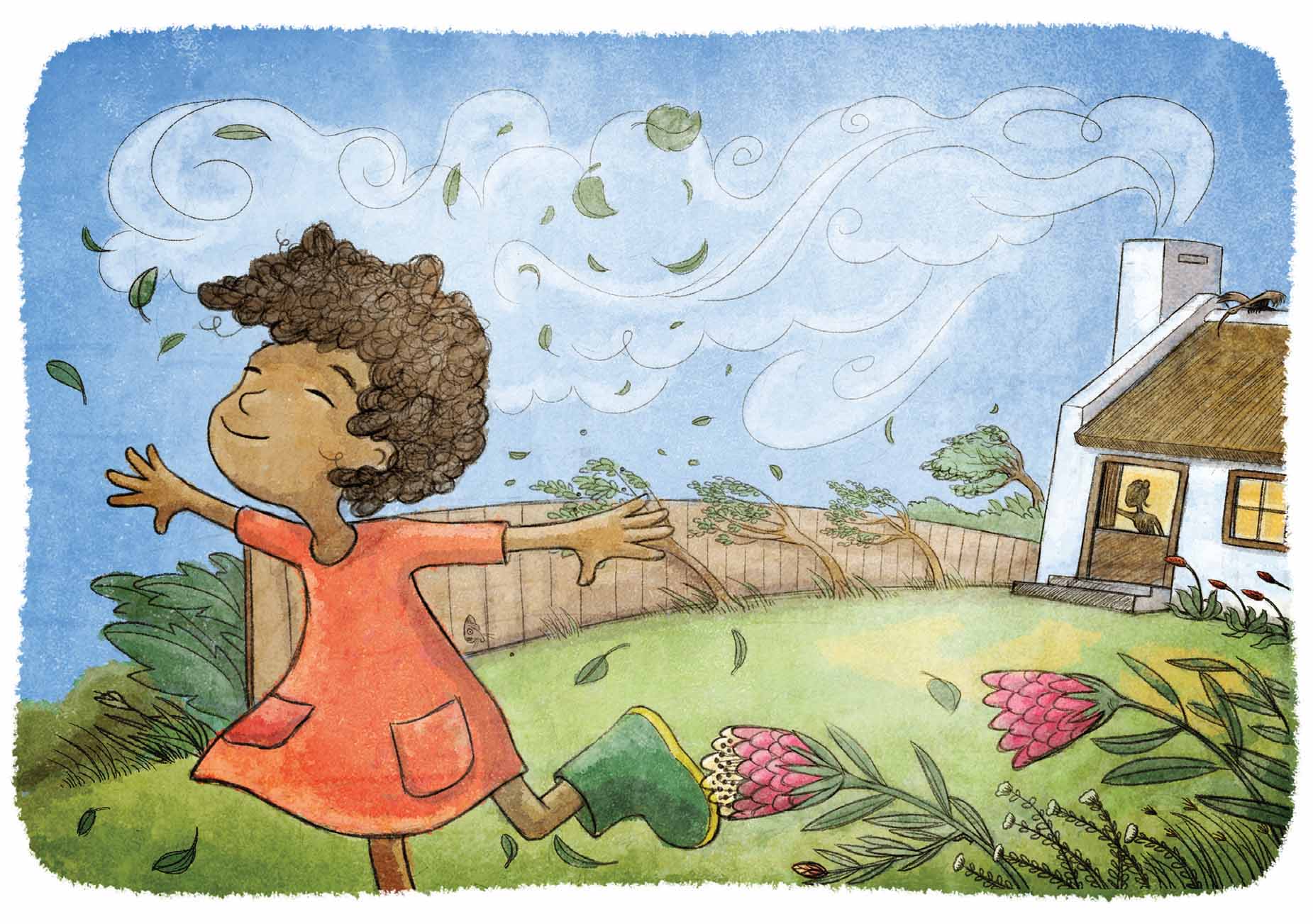
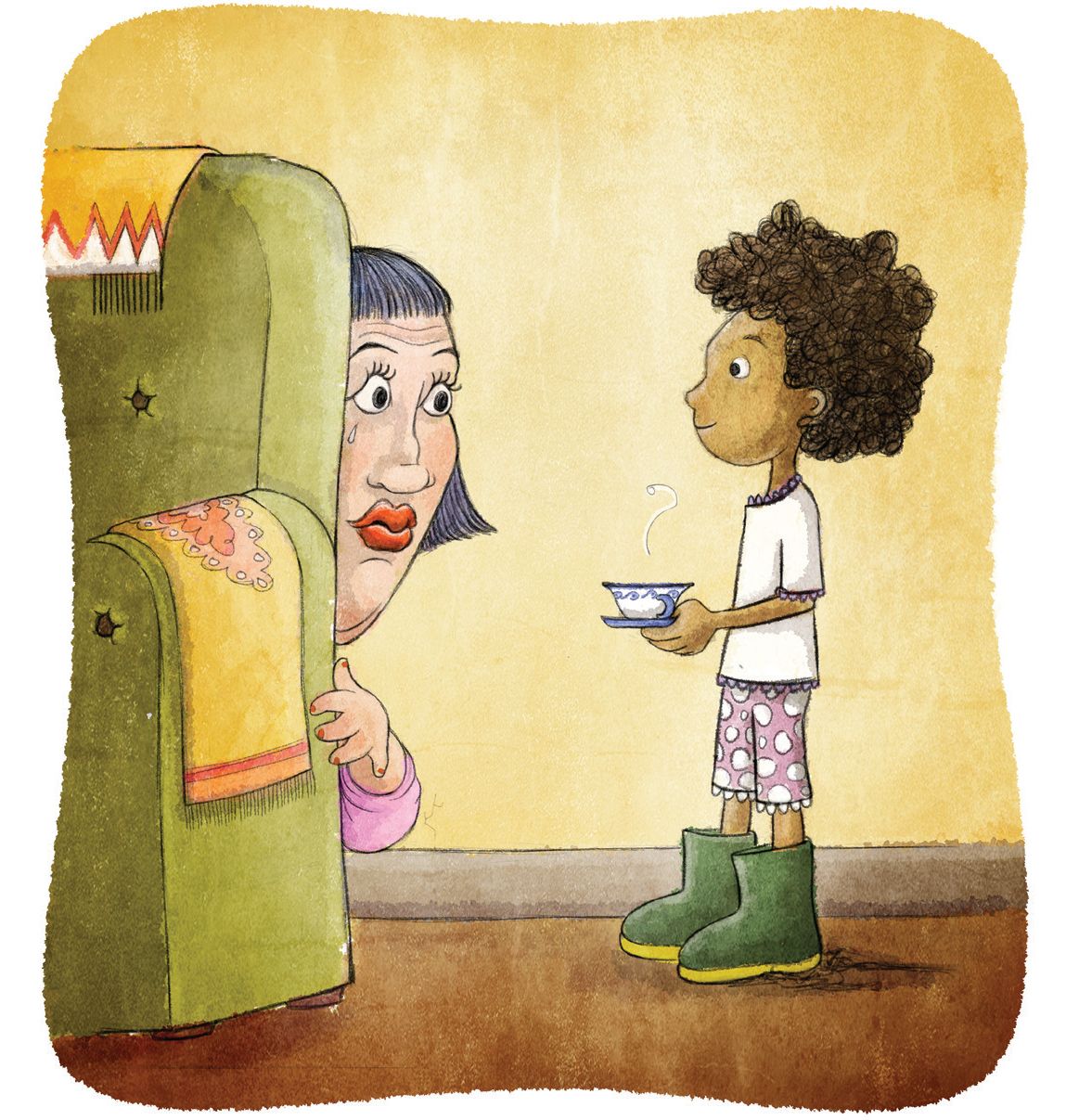
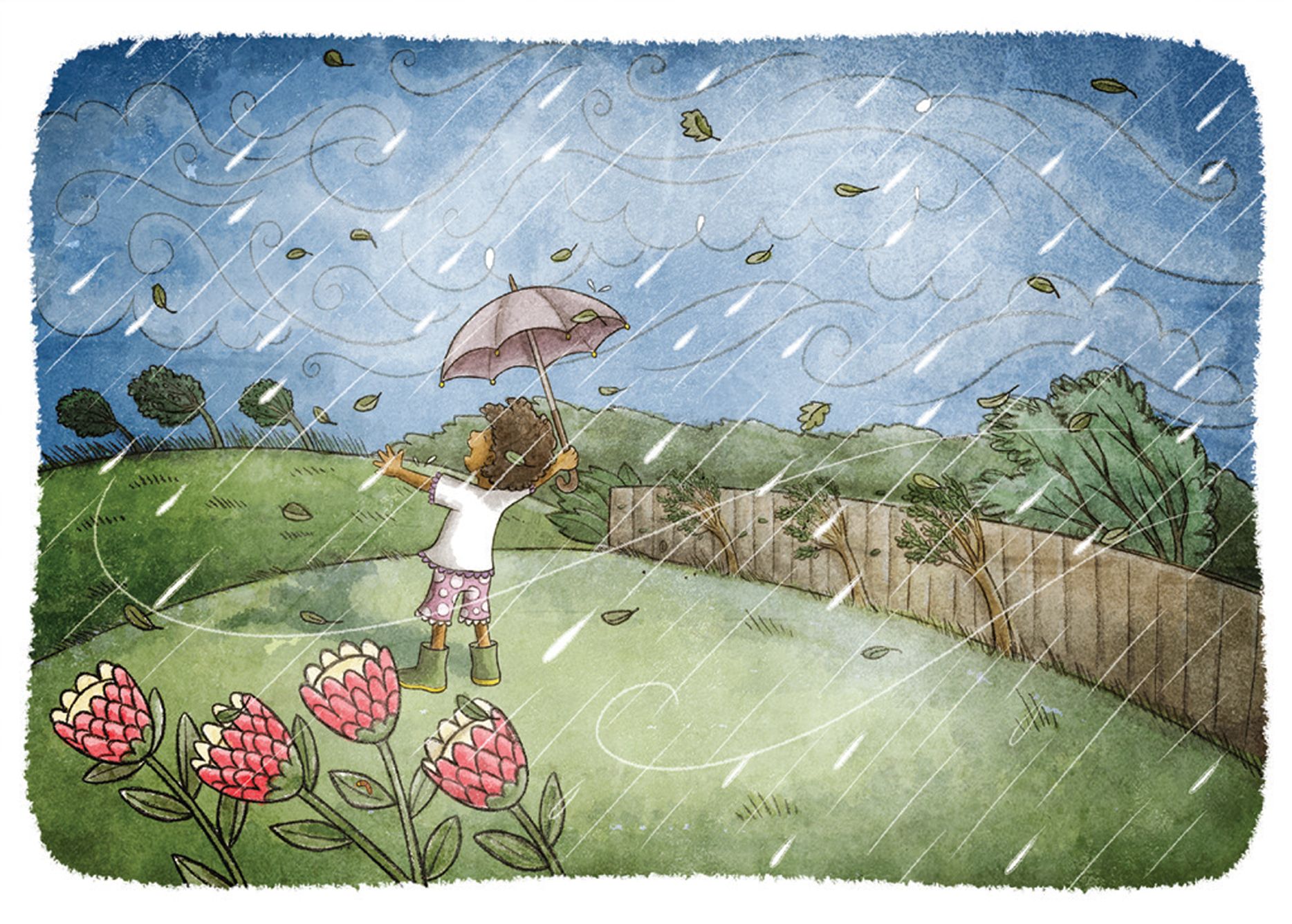
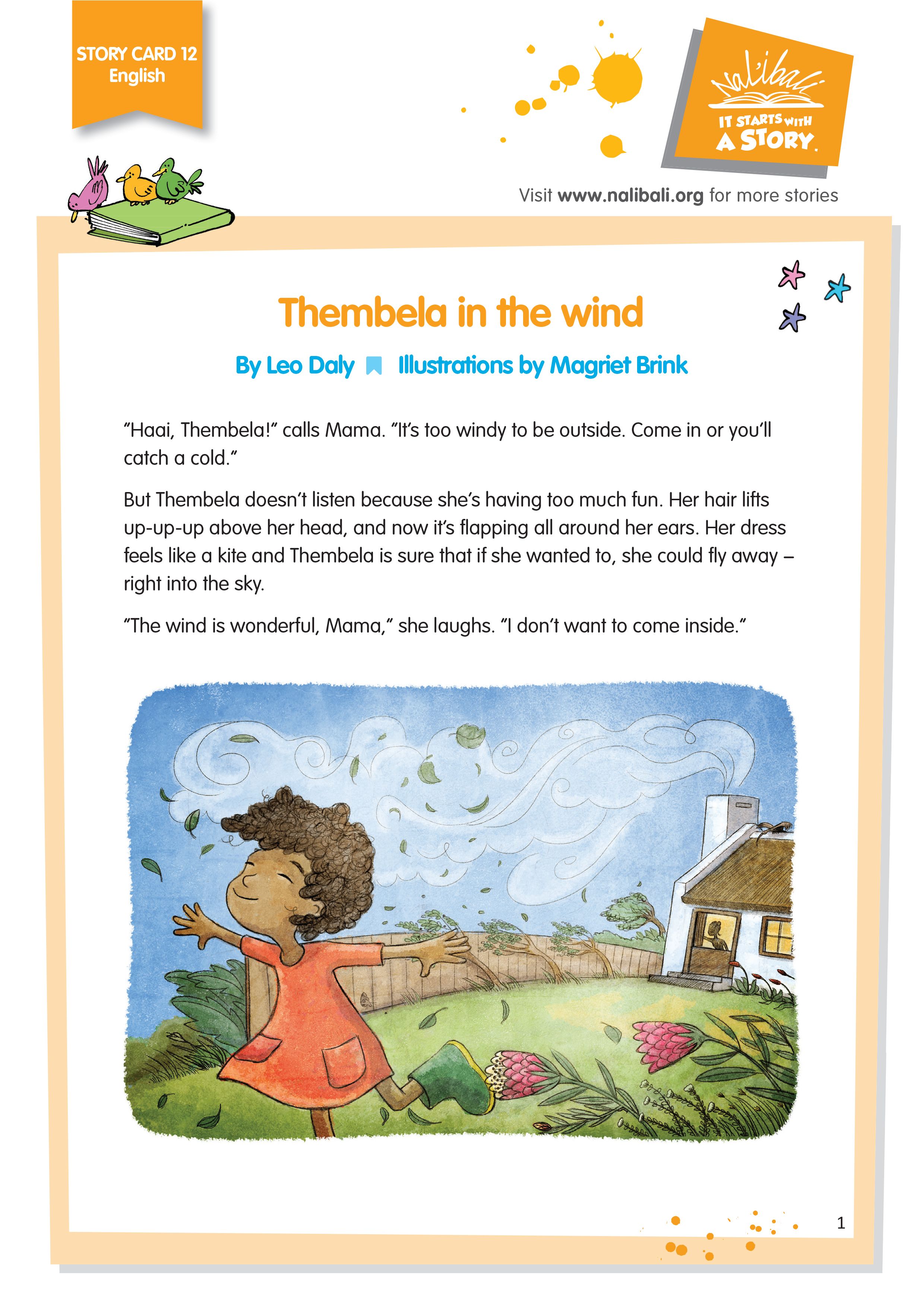
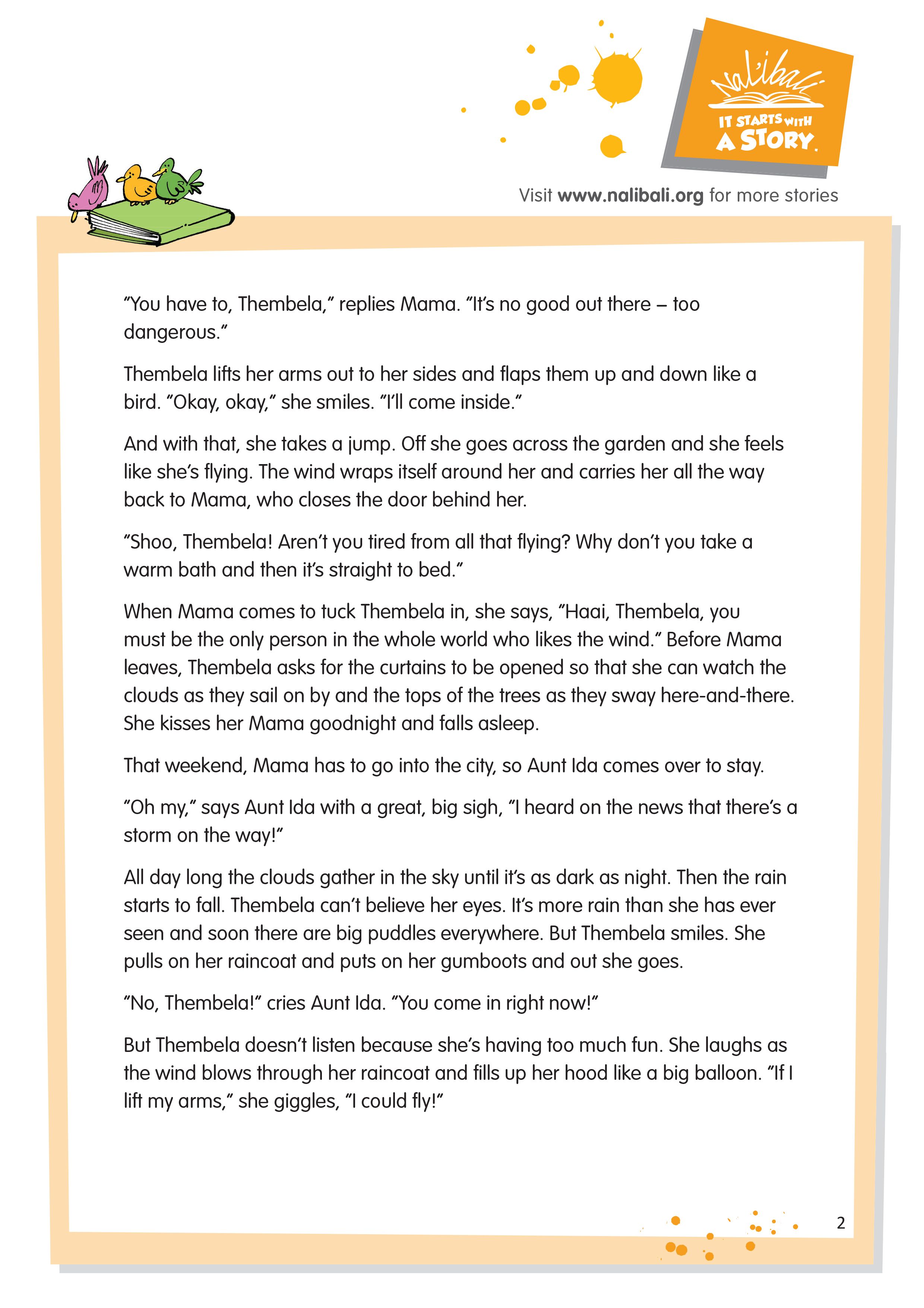
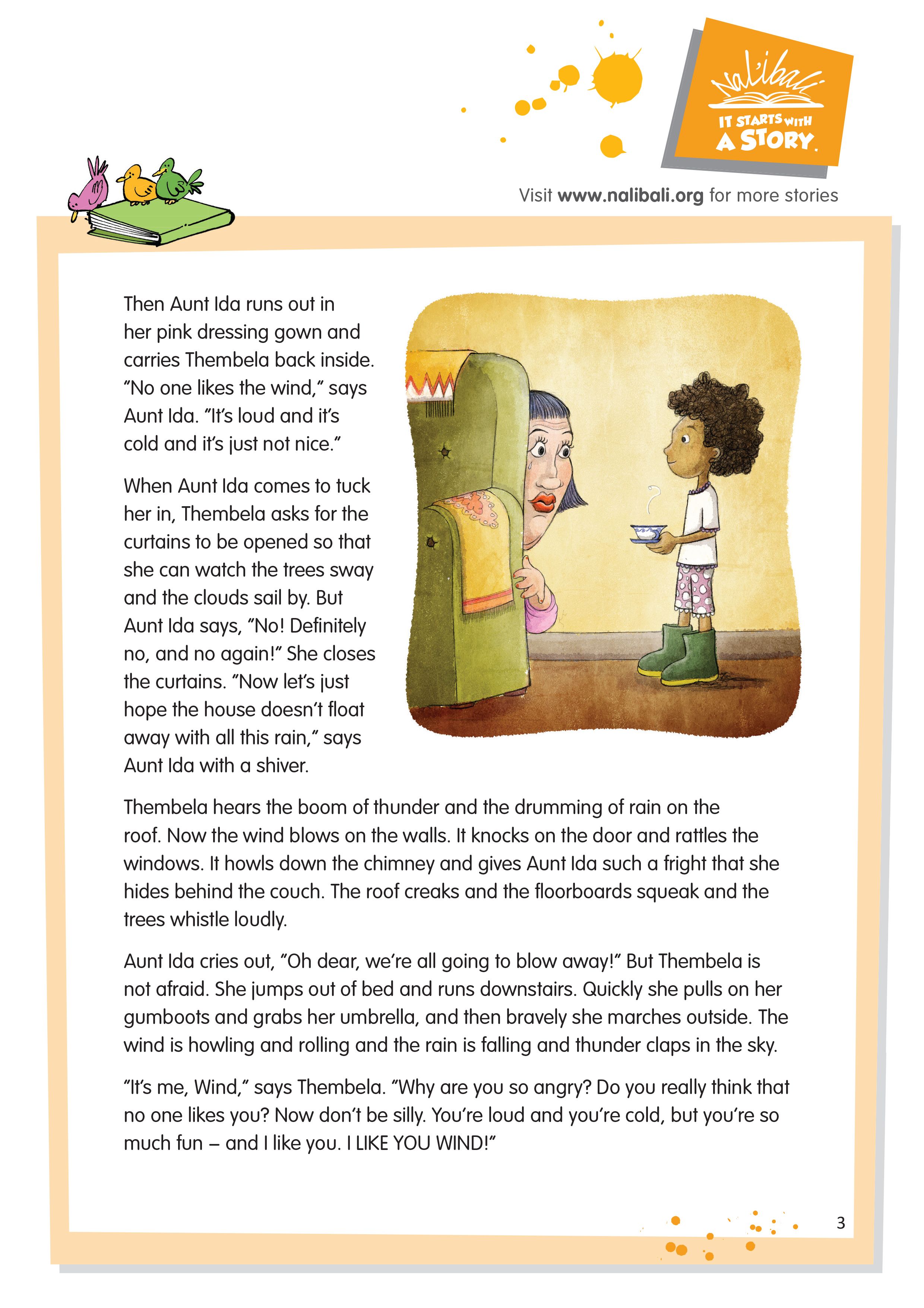
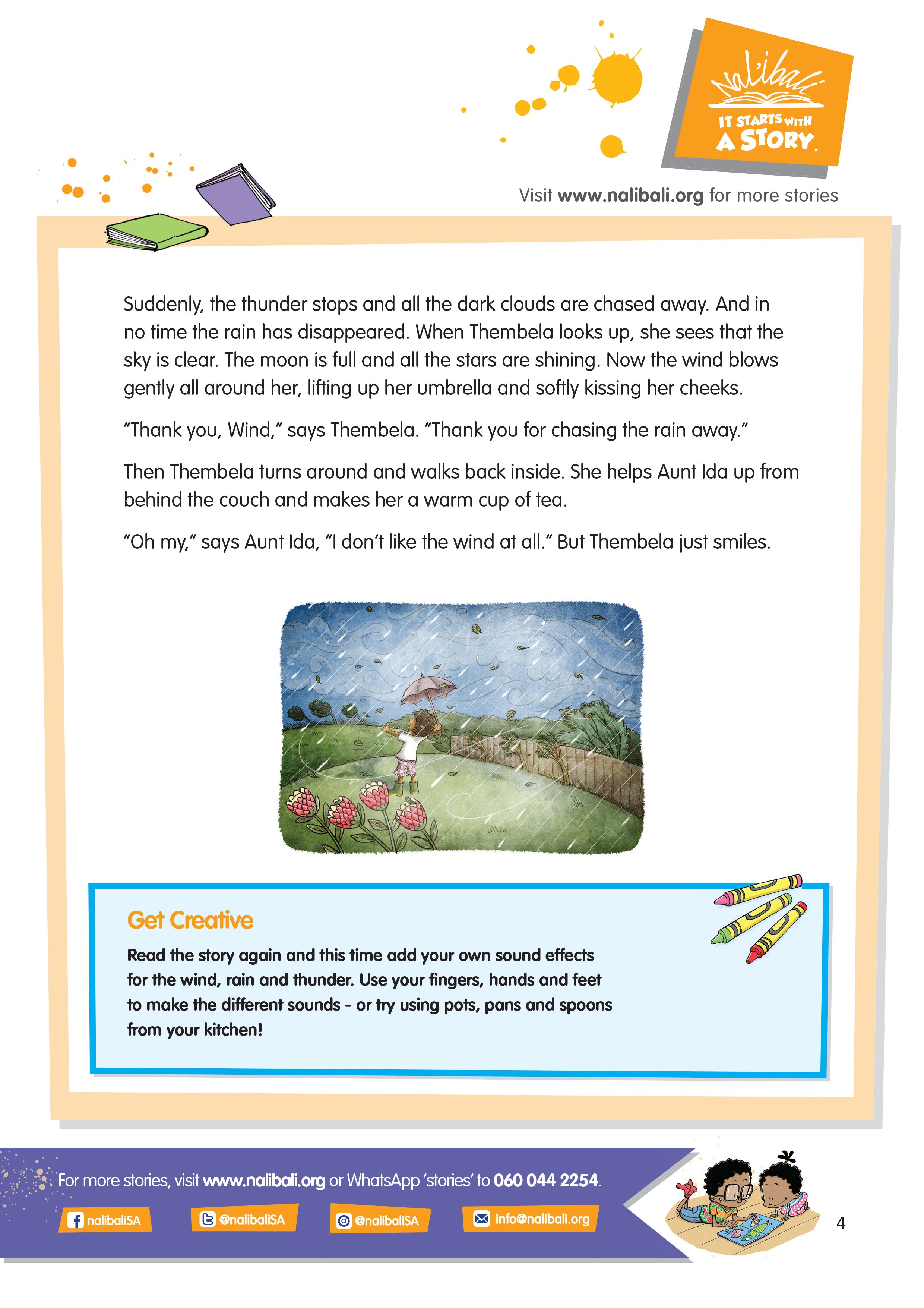




WHATZIT
By Jude Daly
Illustrations by Magriet Brink
It was raining, really bucketing down, and Amina was fed up and lonely. None
of her friends could come and play and everyone in the house was busy.
Everyone was always busy! It was no fun being the youngest.
Amina lay on her bed. And she stood on her head. Then she put on her fairy
wings and started to dance. Amina twirled and whirled. She scurried and
flurried. She even rocked and rolled. Then she fl opped back on her bed. Nothing
helped. She was still fed up and she was still lonely.
So Amina unpacked her toys. Most of them were hand-me-downs from her big
sisters, even the toy box was a hand-me-down. She put Eli, Dassie, Rabbit and
Mouse on her bed. They were going to have a tea party as soon as she found
the teapot.
She searched the toy box
again and that’s when
Amina found Whatzit. It
was lying forgotten at the
bottom of a sewing
basket, at the bottom of
the toy box.
Amina turned Whatzit over
to see its face, but it didn’t
have one. Poor forgotten
Whatzit! It had a shape,
sort of roundish-squarish,
but no face or arms or legs
or wings or tail or anything.
Amina propped Whatzit up on the bed between Eli and Dassie and opposite
Rabbit and Mouse. She found the tea pot and poured the tea. Eli, Dassie, Rabbit
and Mouse finished their tea in no time, so did Amina. But Whatzit didn’t. Well,
how could it without a mouth!
So, Amina took Whatzit and the sewing basket and went to find her granny.
“What’s that?” asked her granny.
“Whatzit,” said Amina. “Whatzit needs a mouth.”
“Okay,” said Amina’s granny, “but we must be quick, I am very busy and still
have so much to do.”
Amina’s granny helped her sew a mouth for Whatzit; a nice smiley mouth.
“And Whatzit needs a nose,” said Amina. But already her granny was not
listening.
Amina went to find her middle sister, Fozia.
“What’s that?” asked Fozia.
“Whatzit,” said Amina. “Whatzit needs a nose.”
“Okay,” said Fozia, “but we must be quick, I’m really busy and still have so much
to do.” Fozia helped Amina sew a nose for Whatzit, a little turned up nose.
“And eyes,” said Amina. But, already Fozia was not listening. So, Amina went to
find her oldest sister, Shireen.
On the way, Amina’s Dad saw her.
“What’s that?” asked her Dad.
“Whatzit,” said Amina. “Whatzit needs eyes.”
“I’ve got some,” said her Dad, “but we must be quick, I still have so much to do.”
Amina and her Dad sewed on Whatzit’s eyes − two sparkly button eyes.
“And a tail,” said Amina.
“Well, I can’t help you with that,” said her Dad.
So, Amina went on to fi nd her oldest sister, Shireen.
“Oh, my gosh,” said Shireen, “where did you fi nd that?” Amina told her. “Wow!”
said Shireen. “I was making it to give to you when you were born, but I lost it
somewhere before it was finished.”
Amina handed Whatzit to Shireen. “Oh, my gosh,” said Shireen, “it’s so cute. Has
it got a name?”
“Whatzit,” said Amina, “and Whatzit needs a tail.”
So Amina and Shireen made a tail for Whatzit − a wiggly-waggly tail! Then
Amina and Shireen looked at Whatzit and Whatzit smiled back at them!
“How about curly-wurly hair?” asked Shireen, “and some pointy ears? But then
you’re out of here because I’m really busy and still have my own things to do.”
Amina took Whatzit back to her room and propped him up between Eli and
Dassie and opposite Rabbit and Mouse. Then she made a fresh pot of tea.
Amina drank one cup and so did Eli, Dassie, Rabbit and Mouse, but Whatzit
was very thirsty and drank three cups. After all, he had waited a long, long time
for tea!
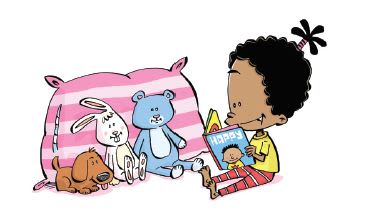
Get Creative
Do you have a special toy like Amina did? Draw a picture of your
special toy and write a short letter to it explaining why it is so
special: “You are special to me because…”
Download the story card below:
